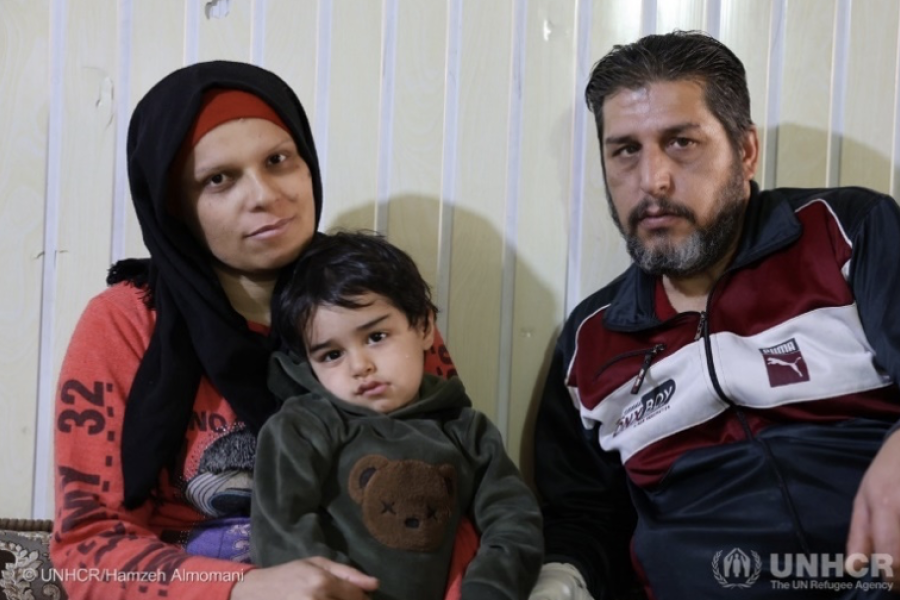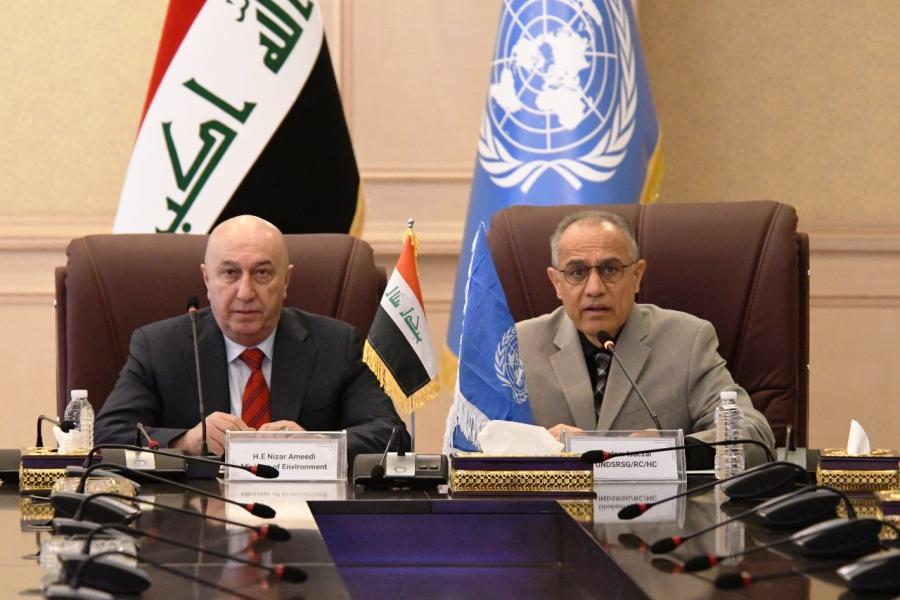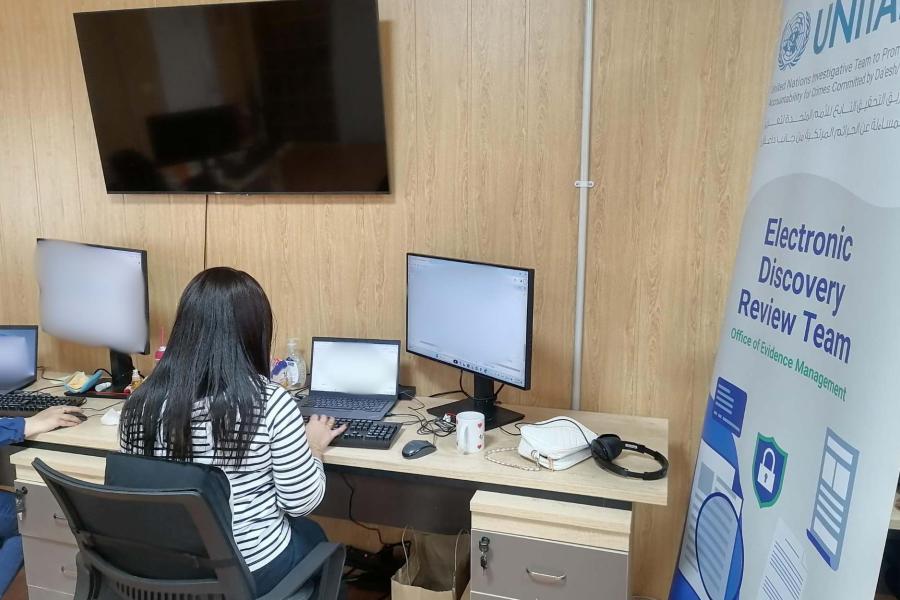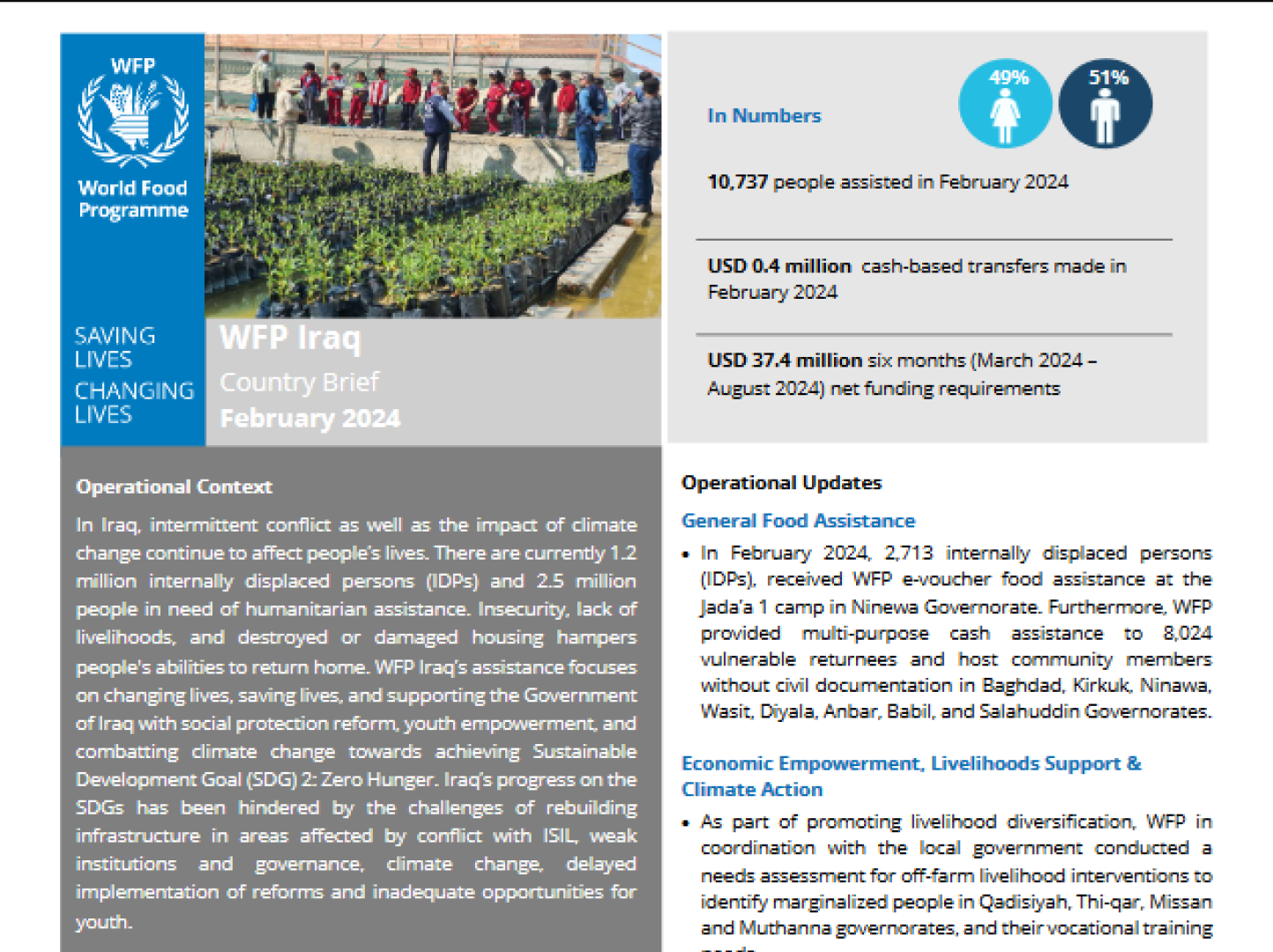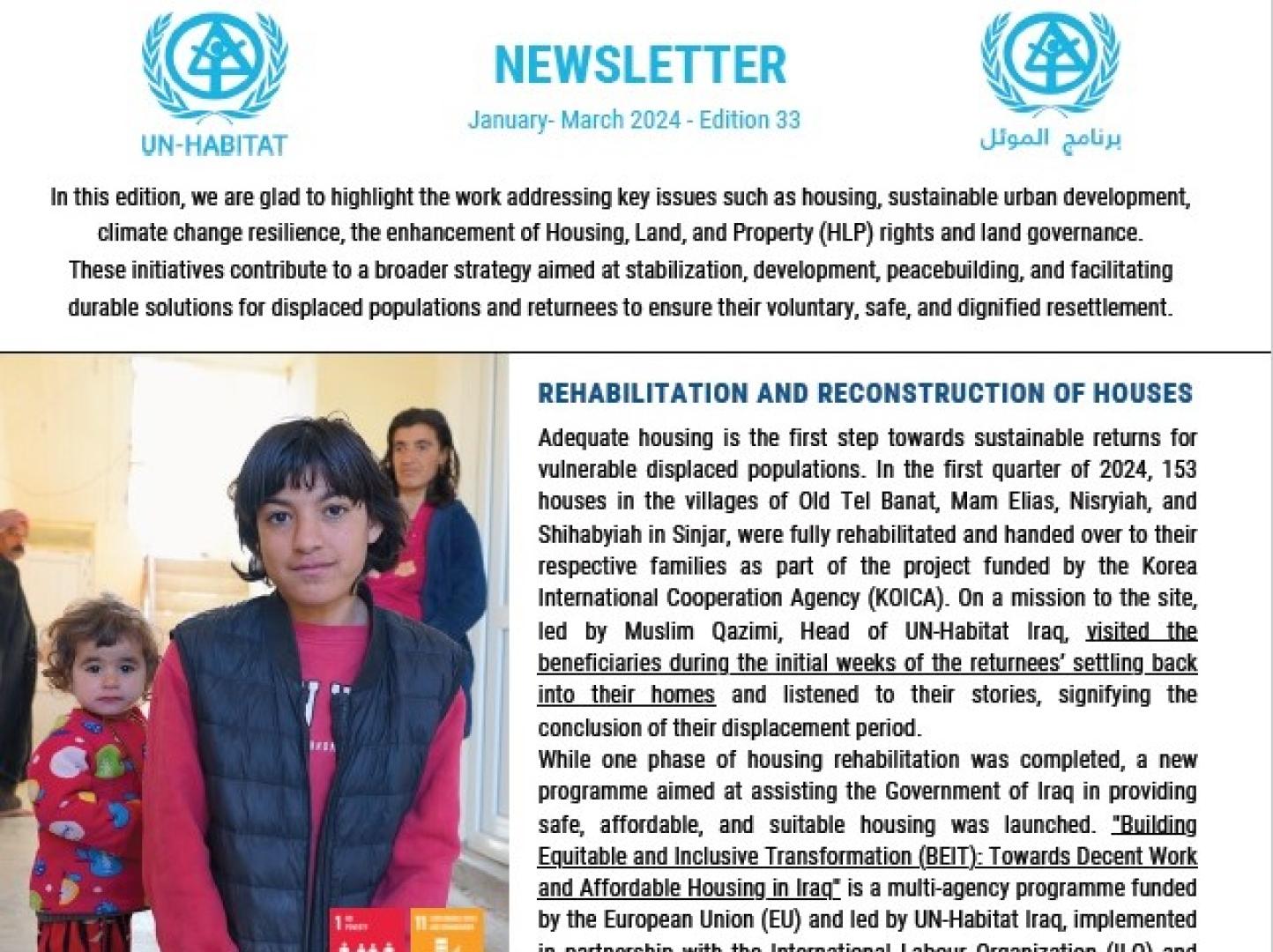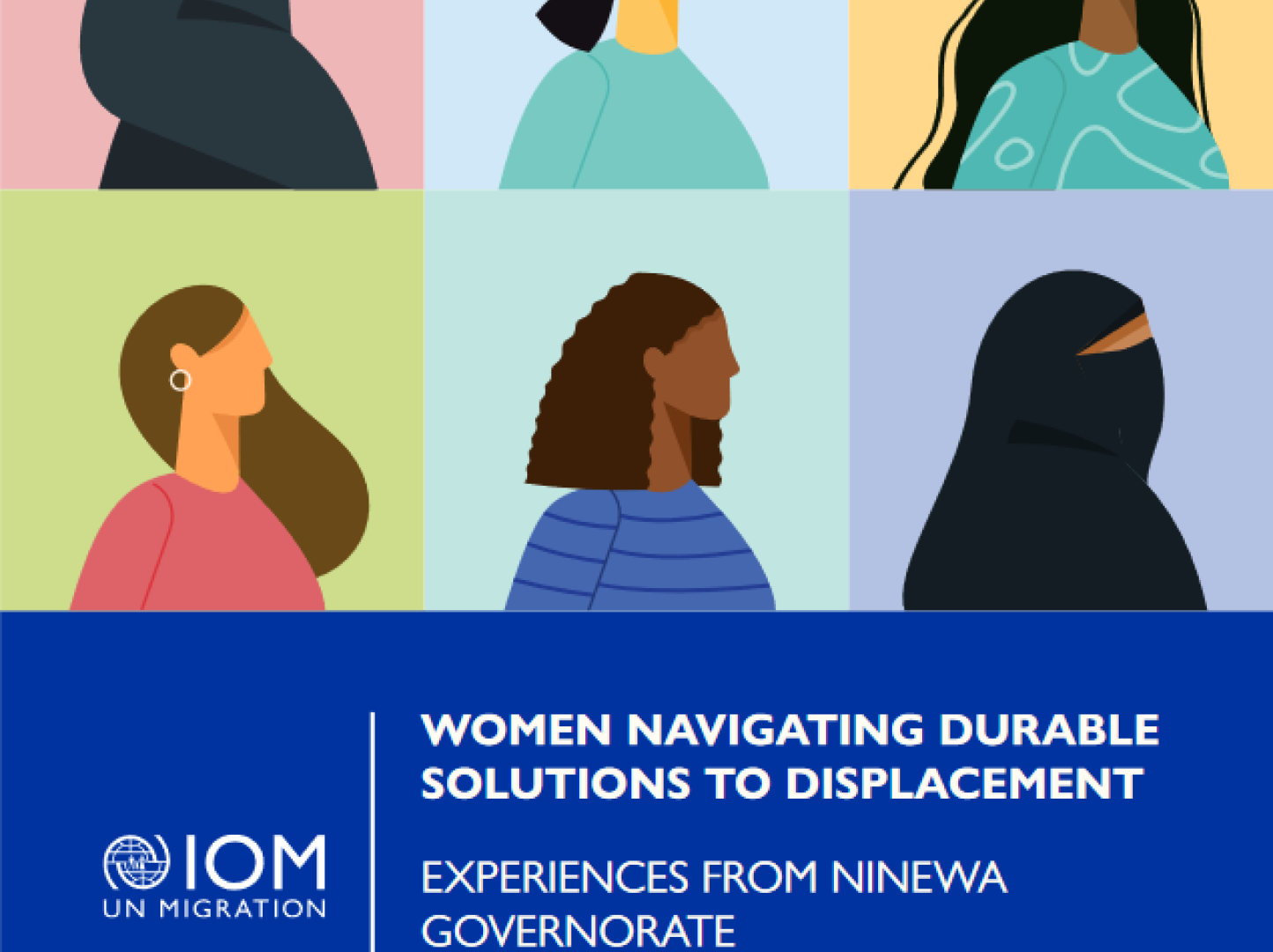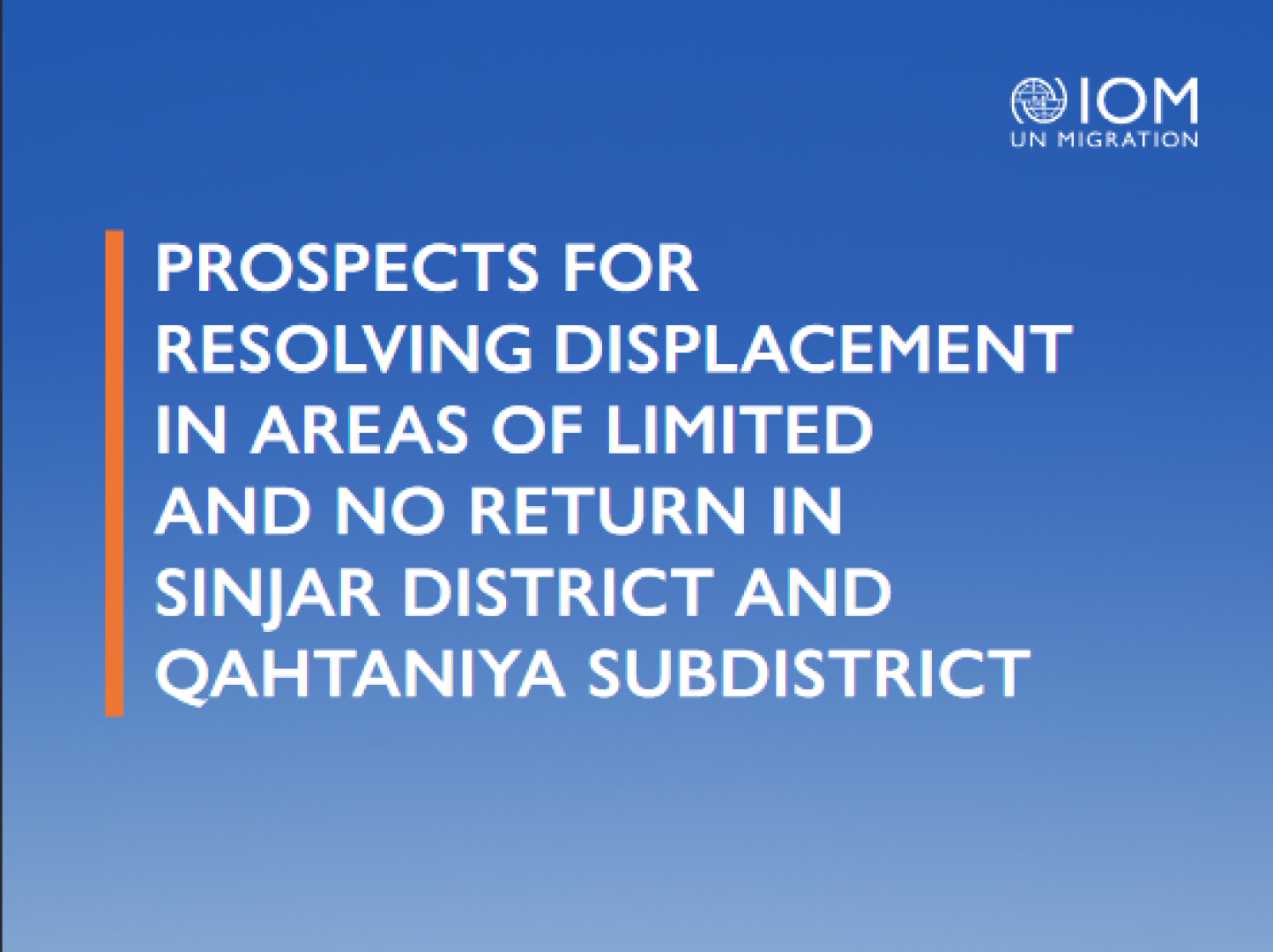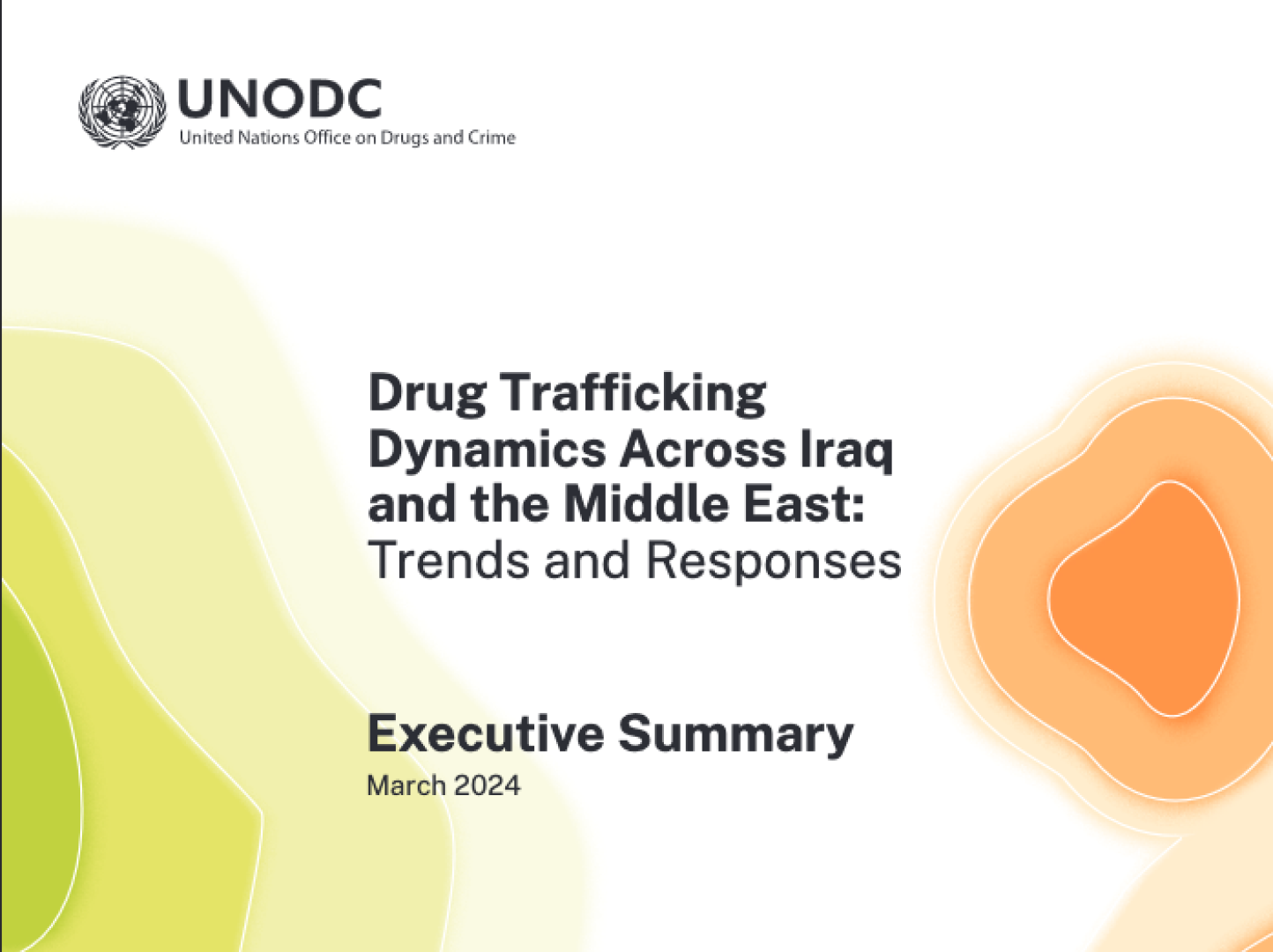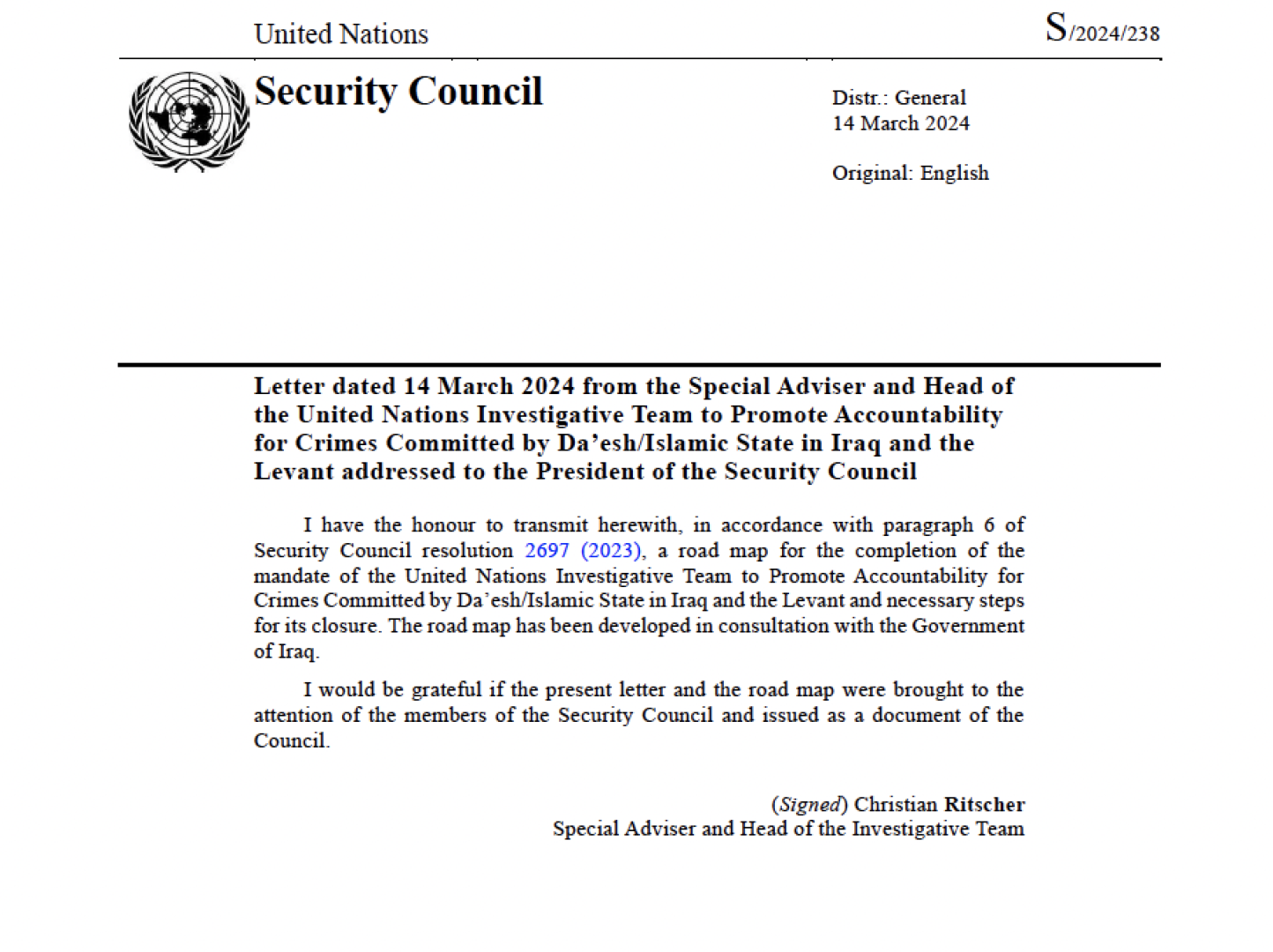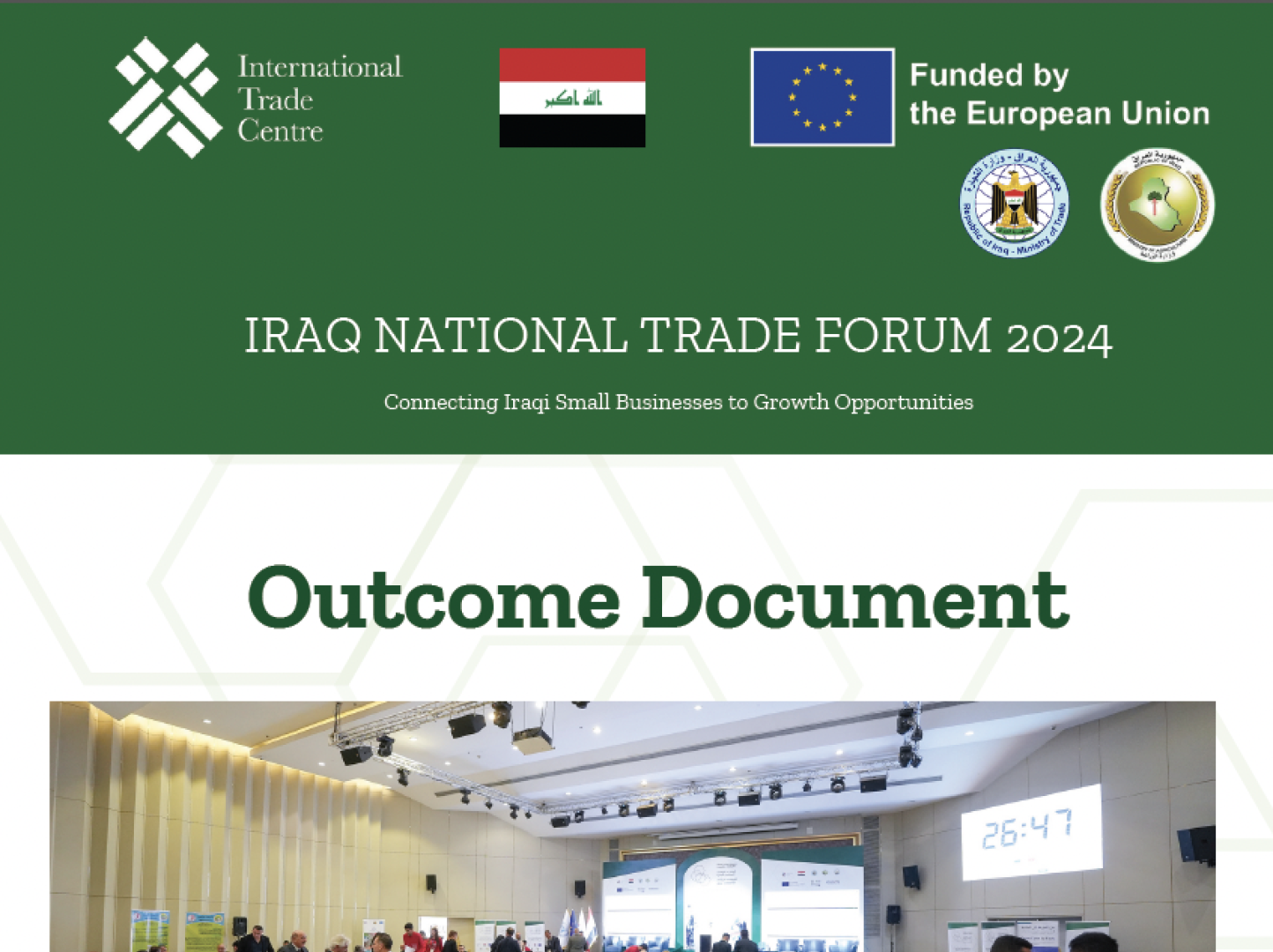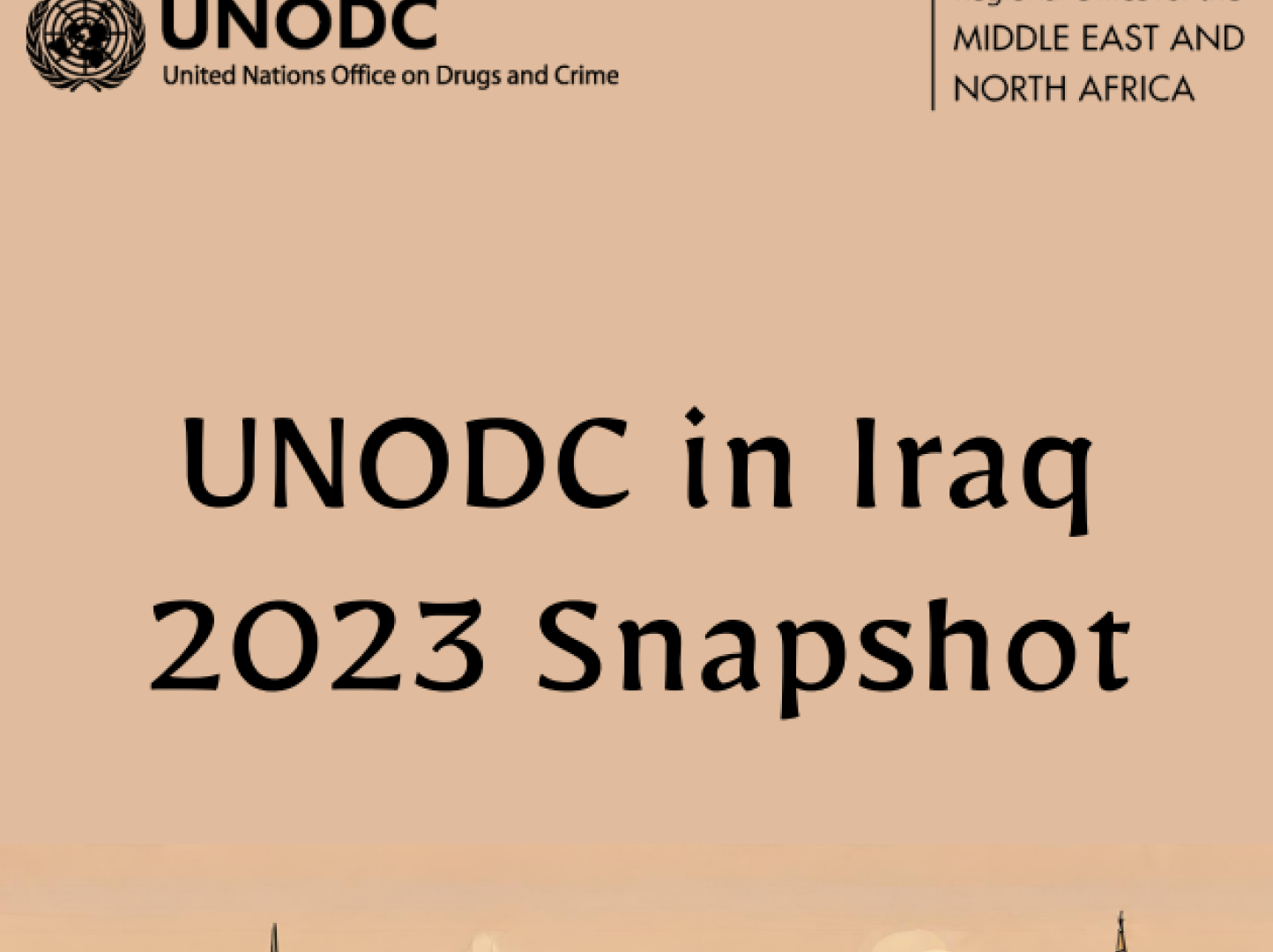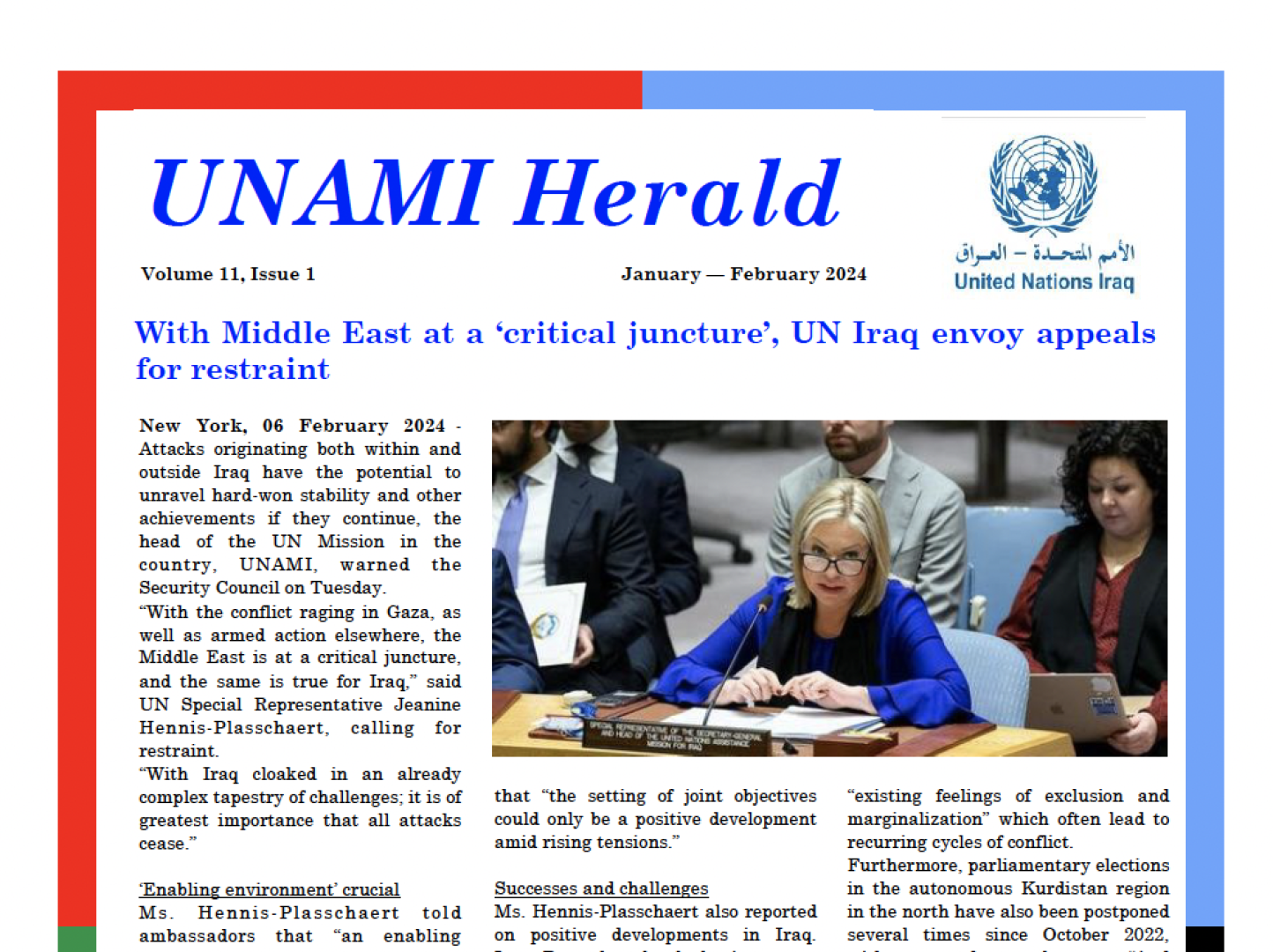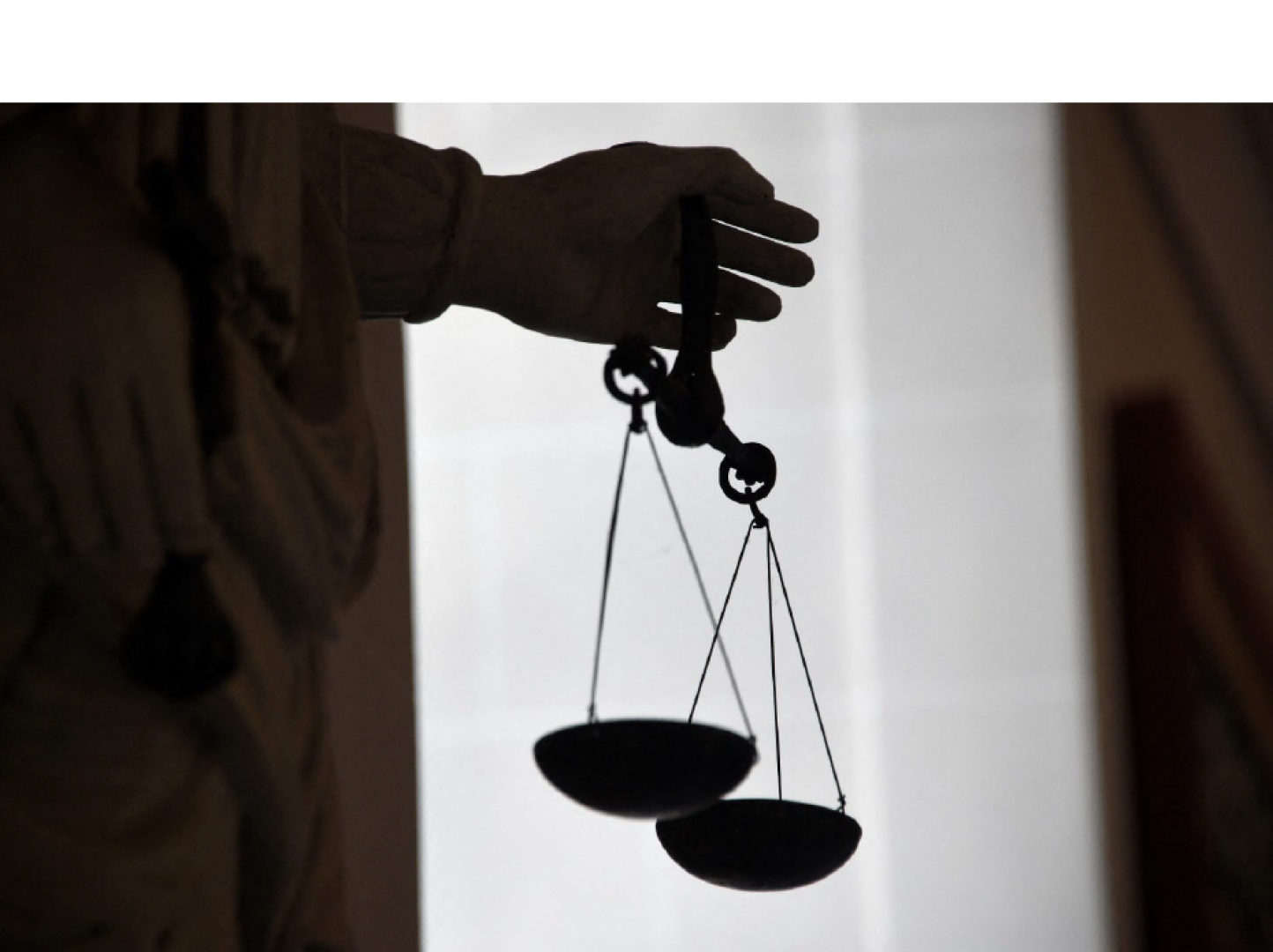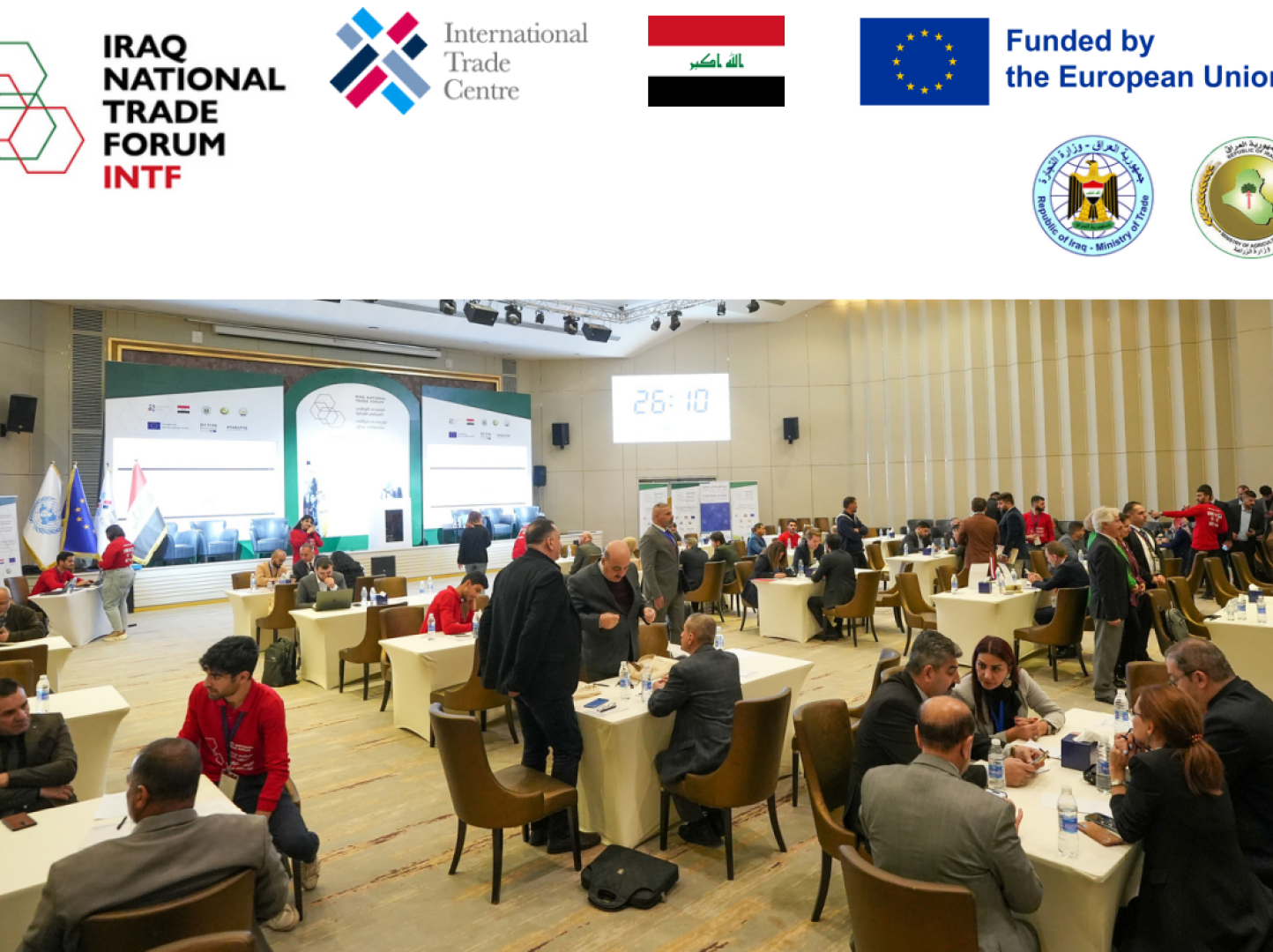Latest
Press Release
14 April 2024
Up to 7.5 million children to receive life-saving measles vaccination, a government-led initiative supported by UNICEF and WHO
Learn more
Story
08 April 2024
Legal assistance helps Syrian refugee get key documents and lifesaving treatment in Iraq
Learn more
Press Release
07 April 2024
HeRAMS transforms health care management in Iraq
Learn more
Latest
The Sustainable Development Goals in Iraq
The Sustainable Development Goals are a global call to action to end poverty, protect the earth’s environment and climate, and ensure that people everywhere can enjoy peace and prosperity. These are the goals the UN is working on in Iraq:
Publication
25 April 2023
2022 Iraq Annual Results Report
The United Nations Country Team (UNCT) in Iraq consists of 23 UN agencies, funds, and programmes led by the UN Resident Coordinator and Humanitarian Coordinator, who is the designated representative of the UN Secretary-General for development operations in Iraq.
The UNCT focuses on achieving Iraq's commitment to Agenda 2030 and the Sustainable Development Goals (SDGs) by providing evidence-based actions and specialized expertise.
The UN family's principle is to "leave no one behind," which guides all of its work in Iraq, with tailor-made support provided for the most vulnerable, disadvantaged, and socially excluded populations.
The UN in Iraq collaborates in a coherent manner to assist the government in achieving national development priorities and international development commitments, such as the SDGs.
The UN Sustainable Development Cooperation Framework (UNSDCF) 2020-2024 outlines the key shared development goals of the UN system in Iraq.
The UNCT focuses on achieving Iraq's commitment to Agenda 2030 and the Sustainable Development Goals (SDGs) by providing evidence-based actions and specialized expertise.
The UN family's principle is to "leave no one behind," which guides all of its work in Iraq, with tailor-made support provided for the most vulnerable, disadvantaged, and socially excluded populations.
The UN in Iraq collaborates in a coherent manner to assist the government in achieving national development priorities and international development commitments, such as the SDGs.
The UN Sustainable Development Cooperation Framework (UNSDCF) 2020-2024 outlines the key shared development goals of the UN system in Iraq.
1 of 5
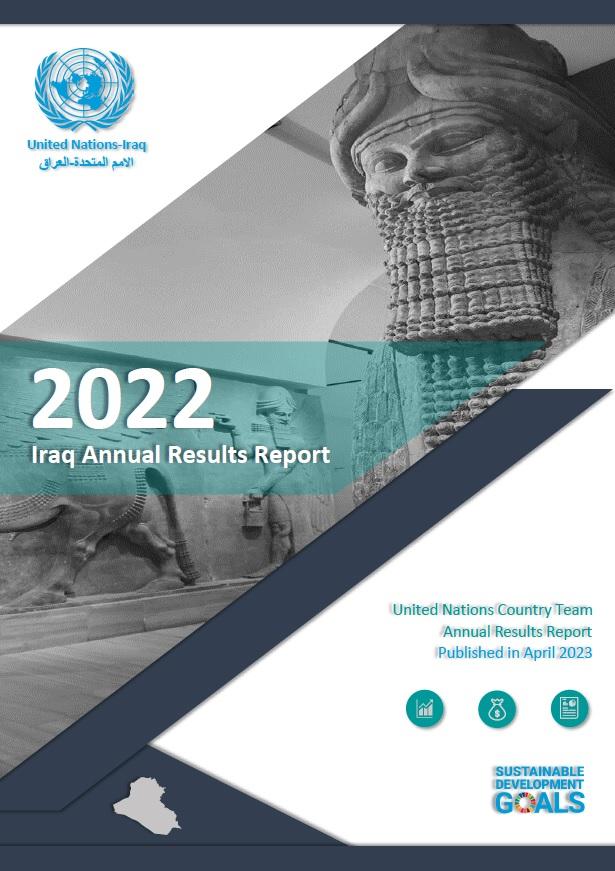
Story
12 December 2023
UN Special Representative for Iraq attends Election Day simulation
The Special Representative of the Secretary-General and Head of the United Nations Assistance Mission for Iraq (UNAMI), Ms. Jeanine Hennis-Plasschaert, attended today a simulation of Election Day processes that was held by Iraq’s Independent High Electoral Commission (IHEC).
The simulation included a comprehensive demonstration of all electronic devices to be used on Election Day, such as voter verification devices, polling station count optical scanners, results transmission devices, and cameras. This simulation was conducted successfully, showcasing the technical readiness of IHEC for the Governorate Council elections, scheduled for 18 December 2023.
In accordance with its 2023 mandate, UNAMI advises and assists the work of IHEC. UNAMI will not observe or monitor the 18 December elections, and is therefore not in a position to undertake an assessment of the manner in which the elections are conducted.
1 of 5
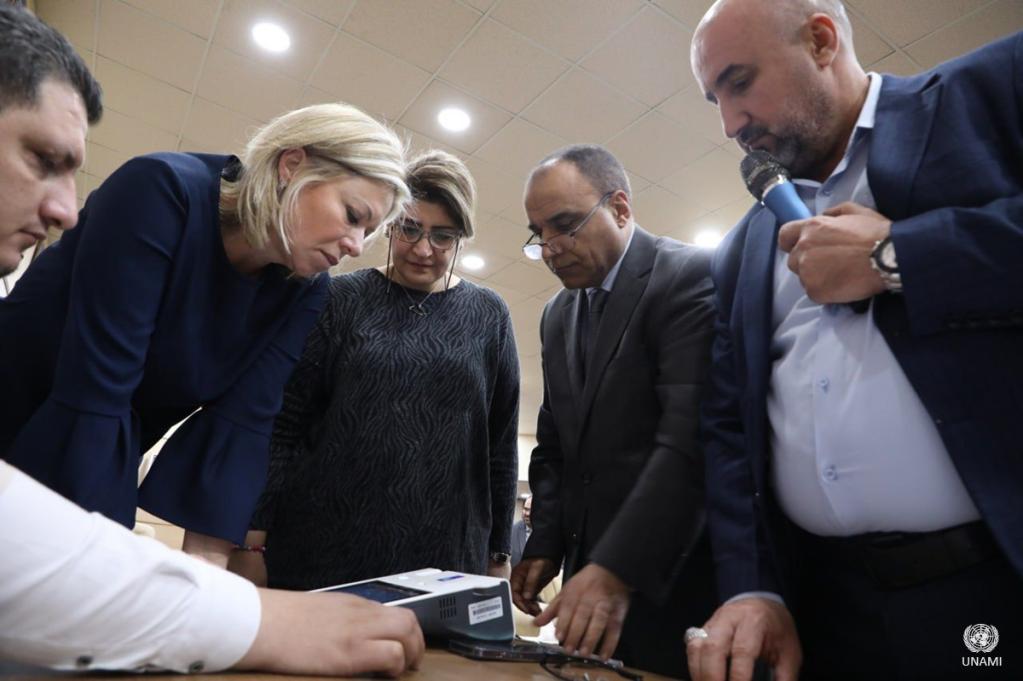
Story
10 October 2023
Briefing to the UN Security Council, SRSG Jeanine Hennis-Plasschaert |10 October 2023 (As Delivered)
Today we are roughly one year on from the formation of Iraq’s current Government, under the leadership of Prime Minister Mohammed Shia al-Sudani. Now, since its inception, several important steps and promising initiatives have emerged. To name but a few:
Long-awaited reforms in the banking and finance sectors are now underway. One example is the launch of an electronic platform for foreign currency sales, which demonstrates the Government’s commitment to both transparency and efficiency.
A new Iraq Fund for Development has been established. This, coupled with the change ushered in by the recently adopted federal budget, has the potential to spur private sector investment.
The passing of a new law on social security means that, for the first time, allIraqi workers can benefit from public entitlements, such as health insurance, as well as maternity and unemployment benefits.
And, as most of you will know, a trailblazing initiative for regional infrastructure, known as the Development Road Project, was launched some months ago.
Meanwhile, Iraq is taking further steps towards leveraging its own natural resources more effectively and responsibly, thereby aiming to reduce energy waste and shore up its energy independence.
Also, and importantly, to address the concerning issue of rapid drug proliferation, the Government has developed a National Strategy for the Prevention of Narcotics and Psychotropic Substances, among other measures.
Now, Mr. President, I already briefly mentioned the recently adopted federal budget.
It charts an ambitious course for the country until the end of 2025 and includes allocations with the potential to address critical needs, such as infrastructure development and reconstruction.
Notably, this budget represents the highest proportionate allocation to the delivery of social services yet – which (hopefully) will expand access to healthcare, education and a number of other essential public services.
To cut a long story short: with last year’s gains in political stability and an ambitious federal budget in hand, Iraq is well positioned to seize the many opportunities in front of it.
That said, and as we all know, the country’s complex and (at times) fast-evolving environment also means that this is not an easy feat, let alone a given.
Corruption is still pervasive. And combatting it, as the Prime Minister recently said, is something the Government “has been working on, is still working on and will continue to work on”. He rightly added: “Without fighting corruption, we will not be able to implement our economic vision and development programs”.
And, true, the Government has made admirable commitments. From efforts to, for instance, increase transparency around custom revenue collection to pursuing the extradition of individuals implicated in the theft of federal resources. And a new campaign, called “Where did you get this?”, has seen the Federal Integrity Commission audit the financial records of electoral candidates.
At the same time, it is clear that the intricate web of graft and vested interests, built up in Iraq over decades, will not be dismantled overnight. Especially when those who stand to lose can draw from myriad financial, political and security resources – creating the community of collusion I have referred to in previous briefings.
Also, and as spelled out numerous times, Iraq’s economic structure is in a precarious place, heavily reliant on oil and a public sector so big that it is simply unsustainable.
And although steps taken so far surely signal positive momentum, further structural reforms are going to be critical. Otherwise, a thriving private sector with high levels of employment will remain elusive.
Now, all of this must be understood alongside Iraq’s rapidly growing population – with predictions that it could double over the next three to four decades.
Why am I saying this? Because with more Iraqis coming of age without corresponding job opportunities or advances in quality of life, it is not difficult to see where this trend may go: the embers of discontent could flare up easily – again and again.
Climate change and water scarcity are, of course, other obvious threat multipliers. This past summer, again, temperatures in Iraq exceeded 50 degrees Celsius. And last June, IOM recorded almost 14,000 families as internally displaced because of drought conditions across 10 of Iraq’s governorates.
Needless to say: if left unaddressed, this is only the beginning of a rather nightmarish situation. Hence, it is for good reasons that the Government has made the issue of water security one of its top priorities.
Another issue that should not be underestimated: feelings of exclusion, marginalization, and stigmatisation. Now, why does this matter for stability in Iraq? Because if these sentiments are left to simmer, among other spillover effects, people will (again) become vulnerable to extremist propaganda.
I am, of course, aware of the ongoing efforts by the Government to end displacement. But further progress on enabling people to return to their areas of origin, including Jurf al-Sakhr and Sinjar, remains critical.
Equally important is much-needed momentum to enact legislation on enforced disappearances, as well as the amendment to the Amnesty Law.
A further topic that cannot be overlooked is the influence of non-state armed actors in certain areas, which not only undermines confidence in the state but also creates an environment of fear and anger.
Mr. President.
The Government continues to proactively engage with countries throughout the region on issues related to energy, water, economic cooperation and security. Important, as regional partnerships and integration are obvious catalysts for stability in Iraq - and beyond.
Now, within this context, I wish to highlight the implementation of the Iraq-Iran security agreement. Great efforts have been made by Iraq, including the Kurdistan Region, to secure its borders. And further work to sustain these achievements is ongoing.
All sides consider long-term security as essential, and we can only emphasize Iraq’s genuine commitment to the agreement.
Now, as I said on many occasions, this is the way to go about addressing security concerns: through dialogue, joint committees and the actual implementation of agreements – all, of course, in accordance with international law.
With this in mind, I wish to express hope that Iraq and Türkiye will also embark on a sustainable way forward. Türkiye’s security concerns are well understood. And, on that note, Mr. President, I wish to echo the Secretary-General’s condemnation of the recent terrorist attack in Ankara.
In saying this, constant cross-border attacks are a risky way to advance interests - and one with numerous adverse effects. We therefore welcome ongoing efforts on the activation of bilateral committees between Iraq and Türkiye aimed at addressing border security concerns.
And, of course, Mr. President, I cannot talk about stability in the region without mentioning the unprecedented and horrendous developments in Israel and the Occupied Palestinian Territory, which have already had a catastrophic human toll and could impact the entire region.
Now, still focusing on the region, Mr. President, I would also like to flag a recent decision of Iraq’s Federal Supreme Court regarding the 2012 agreement between Iraq and Kuwait regulating navigation in the Khor Abdullah waterway.
Taking into account the separation of powers, Iraq’s government has meanwhile made its commitment to the principles of international law, and its respect for bilateral agreements and UN resolutions, crystal clear.
Legitimate concerns have been expressed by Kuwait and the GCC. Given the priority attached by the Iraqi Government to dialogue as a means to finding solutions, as well as its commitment to maintaining positive relations with its neighbours, I hope and expect that cooperation and good neighbourliness will prevail.
Bearing in mind the risks of miscalculation and escalation, it is essential to resolve this matter expeditiously. Also important is the continuation of talks to demarcate the rest of the maritime border.
Mr. President, with regards to Baghdad-Erbil relations: to discuss the Kurdistan Region’s financial challenges, a high-level delegation from the Kurdistan Regional Government, headed by its Prime Minister Masrour Barzani, visited Baghdad on 14 September.
Soon after, Iraq’s Council of Ministers agreed to provide financial relief in the form of ‘loans’ for the next three months. This enables the KRG to pay, for the time being, the salaries of its public servants.
A positive development, and frankly speaking, it was overdue. That said, the agreement is temporary in nature and therefore not enough. Hence, more and urgent work lies ahead so as to avoid a new period of uncertainty for the Region’s public servants.
Now, I said this in past years and will repeat it now: civil servant salaries should be shielded from political disagreements. Like any other Iraqi civil servant, those working in the Kurdistan Region have families to look after and obligations to fulfil.
In August 2020, I highlighted in my briefing to the Council that the lack of specificity in Iraq’s 2005 Constitution continued to shape the debate between Baghdad and Erbil.
With the situation persisting today, what does this mean?
It means that 18 years have gone by without an agreement on the gradual enhancement of the federal system; 18 years without a sustainable framework for natural resource distribution or disputed territories; 18 years without laws delineating rights and obligations. Instead, we continue to witness constant ad hoc crisis management.
So, what I am essentially saying is that, 18 years on from the Constitution’s adoption, it is imperative to move to comprehensive and solid solutions.
As for the Sinjar Agreement, Mr. President, I regret to inform you that no progress has been made. Sadly, instead, we continue to witness different power competitions in which non-state armed actors have the upper hand.
Recent events in Kirkuk, resulting in a number of deaths and injuries, are also of concern. While the situation has calmed down for now, the precariousness of this context cannot be overlooked.
As you know, in past years, UNAMI has facilitated dialogue sessions among the representatives of Kirkuk’s components. And we are still convinced that an agreement can be reached. But for that to happen, it is imperative that the needs of people are prioritized over political gain.
Of course, the Provincial Council Elections on 18 December are of great importance as well. Especially because Kirkuk has not seen local elections since 2005.
Mr. President, something else. Previously you heard me say that the Kurdistan Region’s parliamentary elections are long overdue.
Initially scheduled for October 2022, they were postponed to November this year, and recently further delayed to the 25th of February next year.
To state the obvious: we expect all parties to ensure that this new election date will not again fall victim to internal political strife. With the current administration in a caretaker capacity, the Region’s democratic process must prevail. There is so much at stake.
On a different note, Mr. President. As any other Member State, Iraq has committed – through its Constitution and international human rights treaties – to protect the fundamental rights of all its citizens, without discrimination. This point bears repeating in light of recent debates on the use of universally accepted terms.
Turning to the issue of Al-Hol returnees: last month, a further 173 households returned to Iraq. In other words, Iraq continues to serve as an example for other states with nationals in Al-Hol.
Now, there is no denying it, challenges on the ground abound. The accessibility of core civil and identity documents, in particular their timely issuance, must be addressed as a matter of priority.
And, as Iraq grapples with the vast needs of returnees and host communities, the criticality of continued international support cannot be overemphasized.
Mr. President, zooming in on the issue of missing Kuwaiti and third-country nationals and missing Kuwaiti property – including the national archives.
The adoption of innovative DNA technology by the Government of Kuwait has led to the identification of one more missing person. I extend my deepest condolences to the family involved.
I further welcome the long-anticipated handover by Iraq to Kuwait of 22 genetic profiles that were discovered in March 2022 in Najaf. The regular exchange of genetic data is much needed to shed light on the fate of those still missing.
And of course, we continue to engage the Government of Iraq on the retrieval of missing Kuwaiti property, including the national archives. Swift and decisive action is now needed.
Mr. President, in closing: I can only emphasize the importance of Iraq’s upcoming Provincial Council elections. For many reasons, including the stepping up of service delivery; they represent a critical imperative for all Iraqis.
As a former politician I know how tempting it is to go all out in an election campaign, but things get ugly - and even risky - if campaigns turn into platforms whipping up rage or fear about others.
Therefore, all actors - be they at the national or regional level – are therefore called upon to play their part in maintaining stability in the run up to the December elections. And this should include efforts to counter mis- and dis-information.
With the Government now one full year into its tenure, driving forward the many good plans which Iraq has committed to remains a collective responsibility.
Mr. President, a final word, as I cannot conclude without acknowledging the devastating fire in al-Hamdaniya last month, which claimed the lives of over 100 people. We again convey our sincere condolences.
Thank you very much.
1 of 5
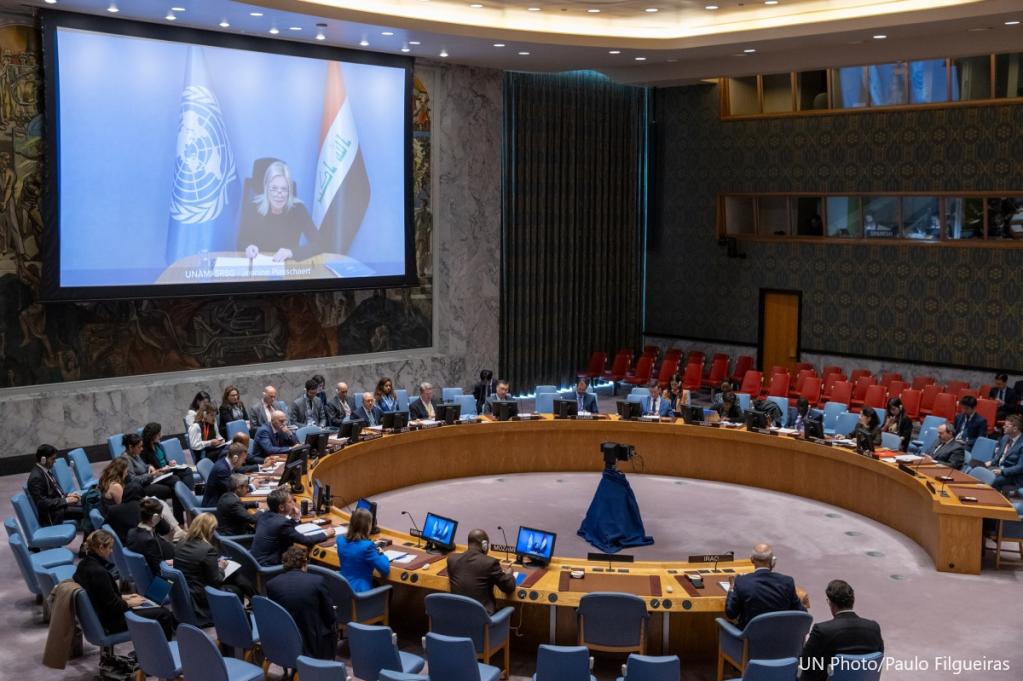
Video
20 June 2023
Remarks by SRSG Jeanine Hennis-Plasschaert | Role of Media/Social Media in Countering Hate Speech
Opening remarks by the Special Representative of the United Nations Secretary-General for Iraq and Head of the United Nations Assistance Mission for Iraq (UNAMI), Ms. Jeanine Hennis-Plasschaert, at the event on Dialogue on Hate Speech Role of Media/Social Media in Countering Hate Speech, organized by the UNAMI Human Rights Office, held in Baghdad on Tuesday, 20 June 2023. In addition, SRSG Jeanine Hennis-Plasschaert’s remarks is also available on the UNIraq website at the following links:
English: https://bit.ly/3pdVVxP
Arabic: https://bit.ly/44aoQS6
Kurdish: https://bit.ly/4463ky7
1 of 5
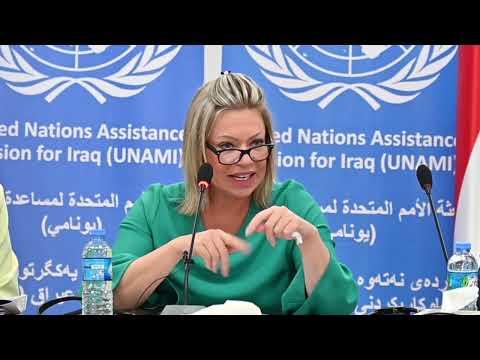
Story
18 May 2023
Briefing to the UN Security Council, SRSG Jeanine Hennis-Plasschaert | 18 May 2023
With UNAMI’s next mandate renewal around the corner, I would like to take the opportunity to reflect, just a bit, and more importantly: to look ahead.
In the past months, numerous people and entities have analysed the events that shook Iraq 20 years ago, as well as the developments since.
Few would deny that it has been a very rough road. A road that has seen not only the compounding of existing fragilities, inherited from the previous decades, but also the exposure of new weaknesses.
And while many acknowledged that Iraq, throughout its history, has overcome some very dark times - they also argued that the drivers of instability in the country’s more recent past remained, for the most part, the same.
Drivers such as corruption, weak governance, the presence of armed non-state actors, impunity, factional politics, poor service delivery, inequality, unemployment, and an overreliance on oil.
Having said this, Iraq’s enormous potential was also widely highlighted, as was the view that the moment to act is now - thereby reaffirming that the confirmation of Iraq’s Government, last October, opened a crucial window of opportunity. So, the question is: where do things stand now?
As I mentioned in my most recent briefing to the Council, last February, the Government has shown its resolve to tackle a number of the pressing issues I just mentioned. And that still holds true. It is focusing on its core priorities and trying to avoid distractions that could threaten to upend prevailing political stability.
That said, of course, it is early days. And we do not have a crystal ball to predict the unknowns, which could include the rise of potential disrupters.
As I keep on emphasizing what we do know is that any government in this position needs time. And that, in itself, is already a challenge. Amid low or no tolerance for a return to the status quo, which existed before October 2022, the harsh reality is that there is no time to lose.
Hence, I can only emphasize the necessity for relentless commitment from a wide range of actors; the significance of placing the national interest over that of any individual or party; the critical role of independent state institutions, and the need for an active, empowered and protected civic space.
Madam President, the Government Programme is leading the way - signed off on by all coalition parties united in the State Administration Alliance. Now, that does not mean that there are no disagreements or quarrels, as is the case in other countries governed by a coalition.
To bridge differences and to follow up on implementation in priority areas, regular meetings between government and coalition members take place. It is quite simple: the balancing of multiple differing opinions and interests requires constant compromise.
Now - does this mean that dynamics, trends, opinions and perceptions from outside the coalition are not relevant? Of course, they are very relevant, I would say.
In other words, the healthy interplay of opposition and coalition must be allowed to function, including through public exchanges between decision-makers, political leaders, authority figures and broader civil society.
Also, and given the delicate balance needed to succeed in tackling core priorities, it is important to take into account the potential wider impact of a new law, action, or proposal - whether initiated in Parliament, the Government or elsewhere.
Will it consolidate or potentially conflict with key objectives? Will it bridge or widen divisions between groups and communities? Will it unite or rather estrange people? In other words, to break with the cycles of recurring crises, what must the priorities be? The fact is that Iraq has a full “to do” list. And, narrow or partisan actions will not help in checking it off.
Madam President, the resources needed to turn certain Government goals into realities, such as adequate public service delivery, should be unlocked with the passage of a federal budget. This is yet to happen and, these days, all eyes are on Iraq’s Council of Representatives.
Needless to say: agreement on a functioning budget, sooner rather than later, is critical. Including for the timely organization of the long-awaited Provincial Council Elections, now announced for no later than 20 December this year.
Meanwhile, Iraq continues to rely on oil. And the public sector remains the biggest employer. Now, these phenomena are, of course, nothing new. But, as I have said so many times, neither can last indefinitely. Economic diversification and major structural reforms remain urgent.
And yes, there is no denying it: this will prove to be challenging. For various reasons, including public expectations. After all, rather than developing an employment-generating private sector, successive governments opted for the easy way out. That is, the creation of public sector jobs to “hush” civil unrest. This has led to a wage bill no country could afford.
In saying that, let me also (and once again) emphasize, that much-needed reforms will not take root if choked by the weeds of patronage and graft. Also, as I already mentioned, independent state institutions are critical. No training, capacity building or technical assistance programme can combat the ill effects of political interference.
The good news is that the Government has taken an express stance against the adverse effects of corruption, which stem from the system as constructed over the past two decades. And yes, vested interests will make the required systemic reform undoubtedly an uphill struggle. But it must be done.
In speaking of reforms, I would like to acknowledge the efforts of the Government in pushing Iraq closer to a state of energy independence. Again, this will not happen overnight. But, from the issuing of new licensing rounds to efforts to reduce energy waste, including a clampdown on gas flaring, this ambitious goal is increasingly closer to being reached.
Turning to the Kurdistan Region, Madam President. Disagreements between the two ruling parties in recent months drove the Region close to the brink. It was for good reasons that the political situation was described (by many) as increasingly reckless and irresponsible.
While it is our firm belief that outstanding fiscal, administrative, security and electoral disagreements could have been addressed months ago, the will to compromise was - for far too long - glaringly absent.
That said, repeated efforts by the Region’s President, as well as others, to have the parties return to the negotiation table, and a recent meeting between the Region’s Prime Minister and Deputy Prime Minister, led, at last, to some good news. After more than six months, the Kurdistan Region’s Cabinet met in full on Sunday.
At this stage, I can only express hope that parties will now step up, bridge differences, and work in the interest of all peoples. One glance at the history or geography of the Kurdistan Region reinforces just how urgent the need for sustainable solutions is.
Also, the Region’s parliamentary elections are long overdue. Initially scheduled for October 2022, an Election Day has now been set by the Region’s President, after consultations with all parties, for 18 November of this year. And, let me use this opportunity to remind parties that time is of the essence. Agreement on outstanding electoral issues must urgently be found. Another postponement would be detrimental to public trust.
With regards to Baghdad-Erbil relations, Madam President, I note that dynamics are still being described as good but complicated. Clearly, the political infighting in the Kurdistan Region did not help, as it also affected the relationship with partners in Baghdad.
On 4 April, following a ruling by the Paris-based International Court of Arbitration, and in the absence of the long-awaited hydrocarbon law, Baghdad and Erbil announced that they had reached a temporary agreement to allow for the resumption of oil exports through the Turkish port of Ceyhan.
On 10 May, Iraq’s government requested Türkiye to restart the exports. To date, however, they have not resumed. Since taps were turned off on 25 March, it is likely that hundreds of millions of dollars in revenues have been lost.
Allow me here to underline once more the importance of anticipatory governance and thus the structural institutionalization of relations between Baghdad and Erbil. Be it the budget, questions surrounding hydrocarbon resources, disputed territories, the implementation of the Sinjar Agreement, or any other outstanding issue for that matter, it remains essential to move beyond ad hoc engagements.
Zooming in on Sinjar, we can only express disappointment that little to no progress has been made in the implementation of the 2020 Sinjar Agreement. This is despite the repeated declarations of commitment. To state the obvious: such stagnation creates further space for spoilers (of different backgrounds and affiliations) to exploit the situation to their own ends. And, it blocks thousands of displaced Sinjaris from returning to their areas of origin.
Sadly, a recent rise in tensions between communities in Sinjar was in large part further fuelled by online disinformation targeting the Yazidi community. Local leaders from all sides have collectively worked to dispel this spike in tensions. But challenges to reconciliation will persist until meaningful steps are taken, including those towards a unified administration, stable security structures and reconstruction.
Now, with the inclusion of the 2020 Sinjar Agreement as an explicit priority in the Government Programme, it is high time to get things done.
Madam President, Iraq’s commendable commitment to the return of its citizens from Northeast Syria continues to serve as an example. While new rounds of returns are expected, work is ongoing to reintegrate previous returnees into their areas of origin or, where relevant, to pursue accountability aligned with applicable laws.
As we all know, the Iraqi caseload is overwhelming, and I can only emphasize the criticality of continued support to Iraq and the need for any country with nationals in Northeast Syria to follow suit by repatriating its citizens.
More generally, durable solutions for returnees from Northeast Syria and all other IDPs remain essential. This is particularly relevant following the sudden closure of a camp in Ninewa Governorate last April. Secondary displacement is difficult to control and creates new risks.
Something else, Madam President: water. Water represents the most critical climate emergency for Iraq. By 2035, it is estimated that Iraq will have the capacity to meet only 15% of its water demands. 90% of Iraq's rivers are polluted, and 7 million people are currently suffering from reduced access to water. This is a significant multiplier of threats to Iraq’s stability.
The priority placed on the issue of water security by Iraq’s Government is, therefore, most welcome. And, plans for the extensive updating of Iraq’s water management systems are said to be underway. This will be vital in meeting demands driven by population growth and urbanization.
The fair sharing of resources among Iraq’s neighbours is equally important. If water is a competition, everyone loses. Bold domestic actions and close regional cooperation offer the only winning solution.
On that note, I also wish to draw attention to a simple fact, which is that regional security, economic and political developments do - and will continue to - impact Iraq. I therefore cannot overstate the importance of the Government’s efforts to scale up diplomacy with and among its neighbours in a number of areas – from border security and trade to water-sharing and climate issues.
Of course, regional stability will also hinge on respect for the principles of sovereignty, territorial integrity, and good neighbourliness.
Madam President, allow me to turn now to the issue of missing Kuwaiti and third-country nationals and missing Kuwaiti property - including the national archives.
The Iraqi authorities, assisted by the ICRC and the Tripartite Commission, continue efforts to locate witnesses and possible burial sites for Kuwaiti and third country nationals.
It goes without saying that we welcome the Prime Minister’s decision to establish a committee, comprising members of security agencies, which is chaired by the Human Rights Directorate of the Ministry of Defence and mandated to support activities in this regard.
We continue to await progress on the retrieval of missing Kuwaiti property - including the national archives.
Madam President, as my last point, let me go back to something I mentioned at the start of my briefing: the need for an active, empowered and protected civic space.
Facilitating and allowing a plethora of different voices to be heard, including those which disagree or critique prevailing decisions, is both healthy and essential.
Hence, I would like to express our sincere hope that Iraq’s leaders and authorities publicly embrace civic engagement, and the freedom of expression at that, to avoid fomenting a renewed sense of isolation and disillusion among Iraqi people, particularly the younger generation and women.
To be clear: accountability, rule of law and respect for human rights are equally essential to preventing recurring cycles of crises.
Now, in closing, and as spelled out so often, Iraq has tremendous potential. And through ambitious Government plans, provided, of course, that they are fully implemented, many drivers of instability can be addressed.
Of course, all of this could be easily spoiled - whether through unchecked corruption, interference from within, intrusion from the outside, a groundswell of disillusion or political horse-trading against the common good.
So, what I am essentially saying is: now is not the time to be complacent, or to take for granted that Iraq has turned a corner. So, I sincerely hope that all remain committed.
Thank you.
BTSC
1 of 5
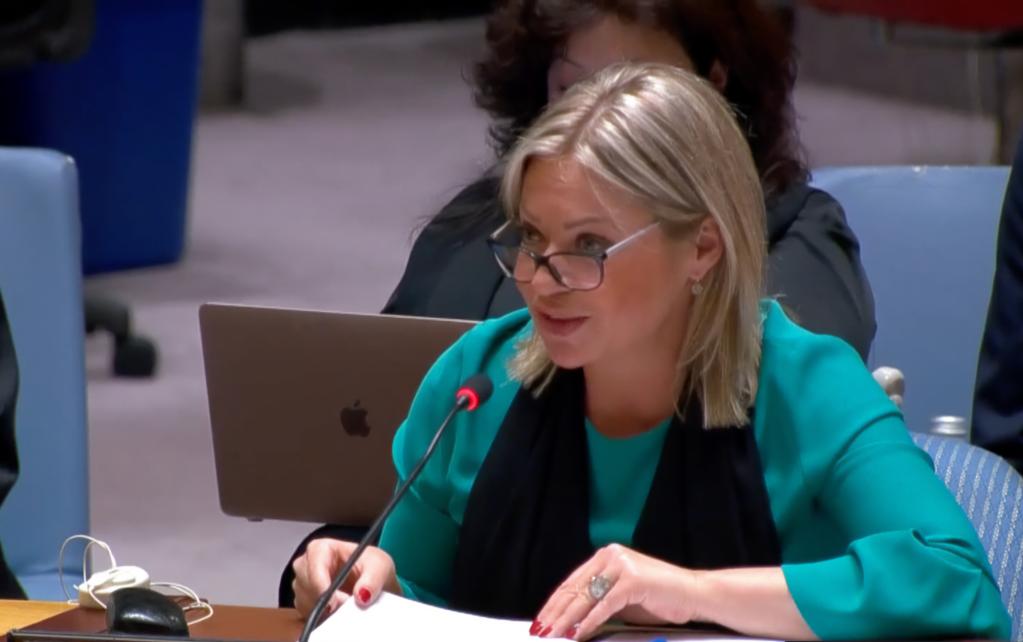
Story
08 April 2024
Legal assistance helps Syrian refugee get key documents and lifesaving treatment in Iraq
Abeer, 38, and her husband Muneer fled their hometown in Aleppo, Syria, in 2021. They rented a small home in Erbil, in the Kurdistan Region of Iraq (KR-I), and slowly began to rebuild their lives. They were overjoyed to welcome their first child – a boy, Joud – soon after. A year later, they felt blessed at the news of welcoming a second child.But, during the first weeks of her pregnancy, Abeer felt constantly unwell. Unable to bear the pain, the worried family visited a public hospital. That is when she was diagnosed with cancer. “I never thought it would be something serious like this. When the doctors told me… I almost fainted. My world collapsed.”Abeer needed immediate and intensive treatments. Due to the criticality of her condition, out of solidarity, the Iraqi Kurdish doctor agreed to give her the first chemotherapy treatment. While the treatment began working on the malign cells, she unfortunately suffered a miscarriage. Any subsequent treatment to give her a change to survive, would require her to present identity documents. “Even with the severity of my condition, without a proof of identity the doctor could only give me one or two treatments... they asked for a UNHCR certificate, but I didn’t have that either,” Abeer recalled of the information she received at the hospital. “If I didn’t get my documents, they would have had to stop my treatment completely.” Without documents, refugees cannot prove who they are. They cannot access healthcare in public hospitals, register their children in school, apply for social security benefits or even move around safely, for fear of being arrested at security checkpoints and deported.UNHCR in Iraq registers asylum-seekers free of charge. In 2023, Abeer was one of over 31,000 refugees who were registered by UNHCR and obtained asylum certificates. With these, refugees can receive Humanitarian Residency Permits from the Kurdistan Regional Government. Having valid IDs enable refugees to prove their identity, access public services on par with Iraqis, and secure employment. It also protects them against arbitrary arrest, detention and forcible returns. “All my worry is gone thanks to having the Humanitarian Residency Permit… at least now I don’t have to worry about the price or availability of my treatment,” sighed Abeer with relief.While registration services are available, and most refugees in the KR-I have obtained their UNHCR certificates and Humanitarian Residency Permits from authorities, others have not been able to readily receive information on the administrative procedures to receive their documents.Thanks to the generous funding of Japan, 4,500 refugees and asylum-seekers benefitted from free legal assistance including counselling and representation from UNHCR and its partners, out of a total of 13,800 who were supported with donors’ contributions. Support from Japan and donors also enabled a total of 7,700 refugees and asylum-seekers to receive information on their rights and the procedure for applying for residency through legal awareness sessions."It was a rollercoaster for me to navigate between my condition, my family and the treatment I might not have access to. It was a very challenging time in my life,” said Abeer. “When they called us and told us that I would be able to get treated, I was relieved."Iraq hosts about 300,000 refugees – mostly Kurdish Syrians residing in the KR-I – for whom return prospects remain limited due to the ongoing insecurity and human rights and humanitarian law violations and abuse. Refugees continue to enjoy a generally favourable protection environment and access to public services, particularly in the KR-I. However, access to territory and asylum remains restricted despite UNHCR’s advocacy to lift existing restrictions.
1 of 5
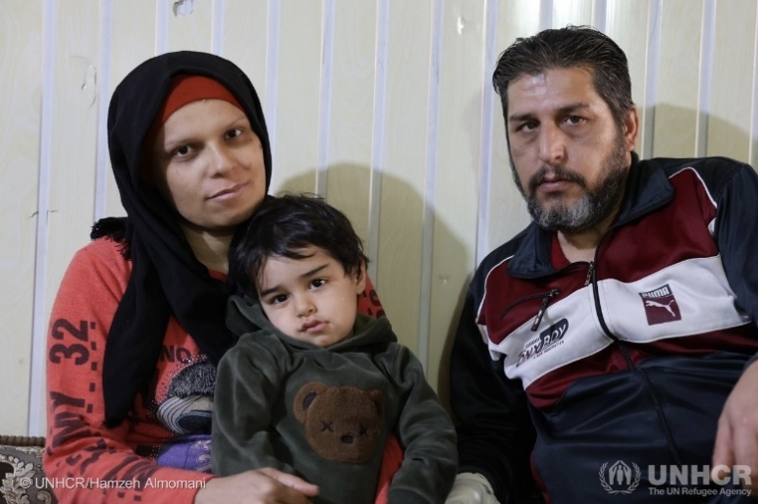
Story
23 March 2024
Recycling to boost water security in climate-vulnerable Iraq
A joint UNAMI-UNICEF programme to recycle wastewater through advanced treatment technology at UN locations in Iraq could serve as a model in addressing freshwater scarcity due to the changing climate.“Iraq is one of the countries most threatened by climate change, which is severely impacting water resources,” Harish Joshi, UNAMI’s Chief of Mission Support, told Politically Speaking. “Water supply is much less than the actual needs.”Water insecurity represents the most critical climate-related emergency for Iraq, where the levels of the country’s main rivers, The Tigris and Euphrates, have dropped in recent years. By 2035, it is estimated that Iraq will have the capacity to meet only 15% of its water demands.At the same time, 90% of Iraq's rivers are polluted, and seven million people are currently suffering from reduced access to water, representing a significant multiplier of threats to the country’s stability.Water scarcity is also drying up wetlands in the south, driving families to leave their land and move to the cities.Recycling water“Our goal is to recycle our wastewater to produce water that can be used for technical and irrigation purposes,” Joshi explained, adding that the mission is setting up an automated irrigation system that will rely on the recycled water, instead of consuming freshwater.“Our expectation, once the irrigation system is completed, is to save up to 53% in freshwater consumption in Baghdad,” Joshi said, adding that the overall investment of $1.16 million in the wastewater treatment plants in the four UN compounds within Iraq should be recovered over six years.The plants, which have so far been used in testing capacities, were officially launched on 20 March 2024. Fostering good relationsAccording to Joshi, UNAMI’s initiatives to reduce the mission’s carbon footprint and water consumption can provide an example to follow for both the local community and the other institutions in neighboring compounds.“It is our intention to get our neighbors on board providing them with options to use the treated water for their irrigation purposes rather than leave it out in the river”, he explained, adding that this could encourage others to replicate the wastewater and other green projects carried out by the mission, from solid waste management to the use of solar panels.UNAMI is also implementing other measures to save water. For instance, it installed 176 low flow faucets in the kitchens of the compound’s accommodation areas in Baghdad. The mission is also installing water meters to monitor consumption and is regularly raising awareness among staff about using water carefully.“We’re very conscious that the Mission can set an example and show what is really possible,” Joshi concluded.
1 of 5
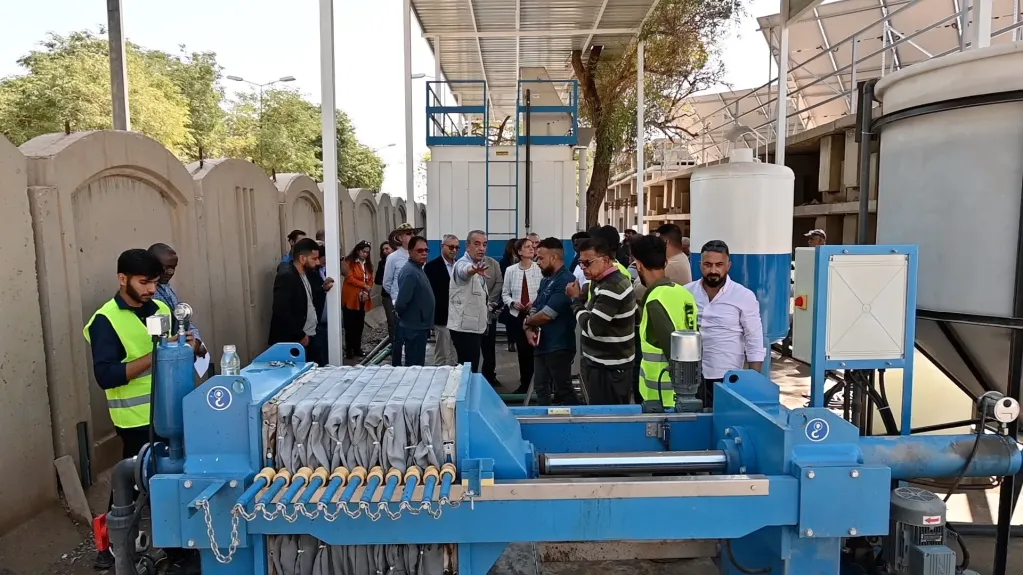
Story
11 March 2024
Launch of the Iraq Environment and Climate Change Policy Advisory Group: a Vital Initiative to Foster a United Front for Effective Implementation of Climate Policies
Today, H.E. Mr. Nizar Amidi, Minister of Environment, and Mr. Ghulam Mohammad Isaczai, the Deputy Special Representative of the Secretary-General of the United Nation, Resident Coordinator, and Humanitarian Coordinator in Iraq (DSRSG/RC/HC), launched the Iraq Environment and Climate Change Policy Advisory Group in Baghdad.The Group will serve as an informal platform to foster policy dialogue, collaboration, coordination advocacy, and the exchange of information between and among the Government of Iraq, Development Partners, civil society organizations, academia and private sector on all aspects related to climate change and environment. The objective of the Advisory Group is to support Iraq's efforts to achieve its climate and environmental objectives.“Coordination is essential to climate issues for maximizing effectiveness, leveraging resources, and addressing the interconnected nature of climate challenges at local, national, and global levels”, highlighted DSRS/RC/HC.H.E. Minister Nizar Amidi emphasized that “the creation of the advisory group, in support of joint climate action, is considered an important development in strengthening the partnership between the Government of Iraq and United Nations agencies”.
1 of 5
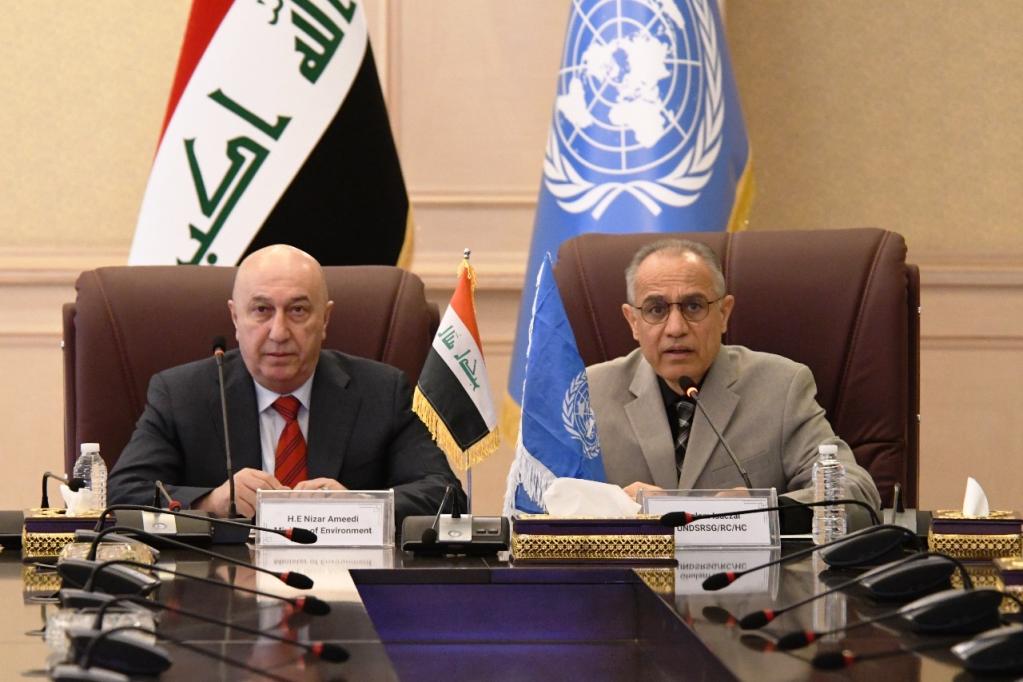
Story
09 March 2024
For IWD, UNITAD highlights young Iraqi female expert
“I thought it is the end of Christianity in Iraq”, said Sarah on how it was like during ISIL’s rise in Iraq.Originally from Mosul, Sarah grew up in Baghdad. She has always been passionate about serving her community. Her desire for raising the voice of the Christian community in Iraq led her to excel in her studies. Once she completed her B.A., she worked as deputy principle for a local school, but she always felt there is more to her ambitions.Her life and the life of her family took a major turn in 2014, when ISIL started systematically targeting the Christian community in Mosul and surrounding areas. “It was a very targeted campaign to empty Iraq of its Christians,” she said, adding “Overnight, my relatives were threatened to either leave or be killed. So, they left without taking anything with them, they lost everything. They went to areas like Erbil, Dohuk, Baghdad. Even we, those who were in the heart of Baghdad, were scared. What if we were next?”The times were bleak for Sarah, her family, and all Christians in Iraq. “It is a state of indefinite fear of what will happen. Can I leave my husband and children and just go to work? Do I take a chance by sending my children to school? Will my husband come home tonight? We were faced by all these scary questions -and even worse- every day.”For Sarah and members of the Christian community, the trauma haunts their lives, even after the liberation. “We are still in shock and disbelief as to how all of this could happen to us, in a blink of an eye. But we firmly believe in rebuilding our community, in justice and healing.” She explains.In the years following the defeat of ISIL, Sarah had learned about UNITAD and its work with all Iraqi communities impacted by ISIL atrocities. “It seemed that this is the place that would allow me to support my community, and make their voices heard; a place that also empowers Iraqi specialists in a range of unique specializations and up to bar with international standards.” Sarah then joined UNITAD as a member of its E-Discovery Review team.The E-Discovery Team enables national experts with advanced technical skills through the use of modern technology for evidence searches and preservation. The Team currently consists of 80% women from a range of communities impacted by ISIL crimes.Since joining the E-Discovery Team, Sarah, along with her colleagues have undergone intensive trainings including on the fundamentals of electronic discovery, focusing on machine-learning aided review, search, and quality control checks. This enables the team to conduct high quality analysis and checks on the sheer amount of evidence to help investigators construct impeccable analysis and cases.Describing the project, Special Adviser and Head of UNITAD Christian Ritscher indicated that: “The E-Discovery Review Team is a part of UNITAD’s larger approach to enhance national capacities in investigations and evidence management. It plays, also, a pivotal role in improving the efficiency of investigations and adherence to international standards necessary for admissibility of evidence in competent courts, all important to the pursuit of accountability for ISIL international crimes committed in Iraq.”“At the start of my work, I thought this would be a very difficult job. But, through the specialized trainings, and the incredible spirit of cooperation among our teammates, I have come to gain more and more skills and felt better equipped to overcome the challenges in this field of work,” said Sarah. “At my team in UNITAD, I found a work environment that supports diversity and empowers the voice of minorities, which makes me thrive.”The truth about what happened during ISIL’s rein of terror is very grim. “It is what I experienced and what my family survived. And it is daunting at times. Nonetheless, even at the toughest moments, I remember how brave the survivors have been, rebuilding their lives from scratch, and fighting for justice. I remember my own children and the next generations that deserve to live in peace and security. I think of the future I must help shape for them, in their country amongst their people. And this is where I get my strength to continue. I think that this is my role. To be at a place where we uncover evidence and help shape the truth.”The E-Discovery Team has provided unique chances for national experts, like Sarah, to grow professionally. “Although our educational backgrounds are different, UNITAD’s experts successfully tailored the trainings to maximize learning opportunities for all of us. We learned how to use the skills we are gaining in support of crucial investigations. This opens doors for me and other women to be able to serve at UNITAD, and, in other entities in the future, with the set of skills we have developed, and continue to grow. I think it has been very promising for my future career path. Also, I hope that with more knowledge and experience, I will be able to train other specialists and help grow our national capacities in different entities.”Serving her community in Iraq, and acting as a role model for her daughter, Sarah has always followed her passion and ambition against all odds. “Taking ownership, as a woman, over my own career in a high-tech analytical domain, which has previously been male dominated, is a great step for me, and this project, with our contribution to the investigations into ISIL heinous crimes can be a great leap forward towards accountability. I consider this just the beginning,” concluded Sarah.
1 of 5
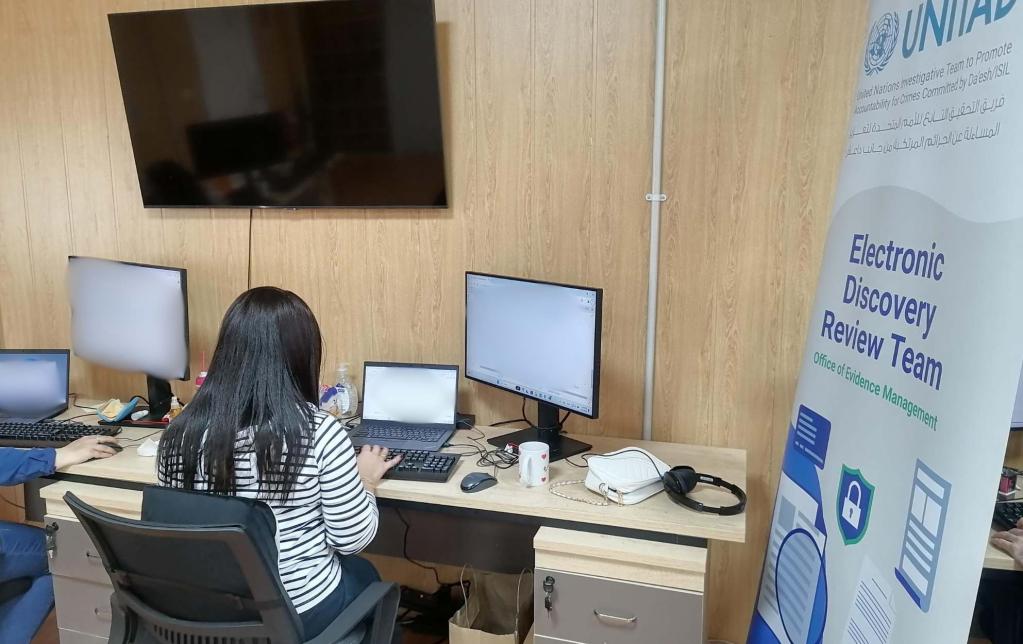
Story
08 March 2024
International Women’s Day Invest in Women: Accelerate Progress
On International Women's Day, we unite to reaffirm our commitment to advancing the rights and empowerment of women and girls worldwide. Under the theme of "Invest in Women: Accelerate Progress”, we recognize the urgency to address the persistent challenges hindering equality between men and women.The economic empowerment of women remains a paramount objective in our pursuit of equality. Secure incomes, access to decent work, and meaningful participation in decision-making processes are essential for creating a prosperous and just society. Yet, globally, investment in women falls short, with $360 billion deficit in funding needed to address the specific needs of women and girls.Investing in women is not only a moral imperative but also a strategic necessity for inclusive economic growth, food security and income opportunities, leading to better outcomes at the individual, familial, and community levels, ultimately contributing to long-term sustainable development and social stability, particularly amongst the most vulnerable communities. To commemorate International Women’s Day in Iraq, National Directorate of Iraqi Women / General Secretariat of the Council of Ministers, in collaboration with UN agencies, brought together high-level stakeholders from the Government of Iraq, public and private sectors, civil society organizations, and international partners to amplify our collective commitment to investing in women. The celebration showcased achievements in women's economic empowerment, identifying key gaps, and charted a way forward towards the achievement of equality between men and women in all spheres of life.Iraqi women have shown resilience and determination in their pursuit of economic empowerment, with initiatives aimed at increasing their representation in decision-making roles. Women encounter additional obstacles, including unequal access to food and resources, wage gap, high levels of informal employment, limited access to entrepreneurship opportunities and financial services, and burdensome care responsibilities. Moreover, women face high risk of violence and discrimination due to social and cultural norms.Iraq has made strides in advancing women's rights, including through legislative measures to ensure women's representation in parliament and political spheres. Recent parliamentary elections saw a significant increase in women parliamentarians, surpassing the constitutionally mandated quota. This progress is a testament to the potential for change and underscores the importance of continued investment in women's empowerment.UN Iraq stands ready to work with the Government of Iraq, public and private sectors, and civil society organizations to accelerate progress towards a future where every woman and girl can realize her full potential.
1 of 5
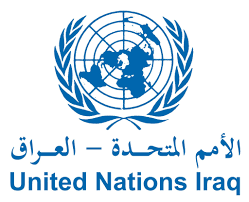
Press Release
14 April 2024
Up to 7.5 million children to receive life-saving measles vaccination, a government-led initiative supported by UNICEF and WHO
Baghdad, 14 April 2024 – Today, the Ministry of Health in collaboration with UNICEF and WHO kicks off a massive nationwide vaccination campaign to protect children from contagious measles, mumps, and rubella diseases. Over 7.5 million children aged 6 - 12 years in primary schools in addition to kindergartens are expected to be reached during this campaign that ends on 25 April 2024.“This campaign comes at a critical time to end the transmission of measles, one of the most contagious diseases,” said Dr. Saleh Al-Hasnawi, Minister of Health. “Through our collaborative efforts with UNICEF and WHO, the Ministry of Health can safely and effectively stop the circulation of the measles virus and save the lives of children from this deadly disease by vaccinating children everywhere.”The Minister of Health for the Kurdistan Region Government, Dr. Saman Barzangy, added: “Measles is a communicable viral disease that the Regional Government is committed to prevent and protect the health of its citizens and future generations by adopting a region-wide mass measles vaccination drive for children in schools and kindergartens.”This massive campaign is fully resourced by the Government with technical support from UNICEF and WHO. More than 30,000 frontline workers will deliver the vaccines, conduct community awareness, and monitor the campaign.“This nationwide immunization campaign reflects the strong commitment of the Ministry of Health to saving children’s lives,” said Ms. Sandra Lattouf, UNICEF Representative in Iraq. “It will strengthen the health system to provide essential health services to every child in Iraq and will accelerate progress towards attaining the Sustainable Development Goal 3.2.”“WHO remains committed to collaborating with the Ministry of Health, UNICEF and all partners to further advance the national immunization programme towards universal health coverage,” said Dr. George Alfred Ki-Zerbo, WHO Representative and Head of Mission in Iraq. “Together, we are steadfast in our commitment to halting the disease transmission, saving lives and securing a healthier and safer future for all.”Ten days ahead of the World Immunization Week, marking 50 years of the essential programme on immunization, this campaign underscores the power of vaccines in saving children’s lives. Over the past five decades, vaccines have saved up to 3 million lives every year, adding to a total of more than 130 million people. Vaccines alone have increased infant survival by 30 per cent. As one of the cheapest and most effective public health interventions, it is critical to continue to prioritize vaccines to reach every child. For more information please contact:
The National Expanded Programme on Immunization, Ministry of HealthDr. Saif Al Badr, Email: dr.saif.moh.iraq@gmail.comDr Firas Jabbar, Email: firas_tuqa@uahoo.comUNICEF in Iraq
Monica Awad, Communication Specialist, Email: mawad@unicef.org
Zaid Fahmi, Communication Officer, Email: Zfahmi@unicef.org
WHO in Iraq
Ajyal Sultany, Communication Officer , Email: sultanya@who.intABOUT UNICEF
UNICEF works in some of the world’s toughest places, to reach the world’s most disadvantaged children. Across 190 countries and territories, we work for every child, everywhere, to build a better world for everyone. For more information about UNICEF and its work for children, visit www.unicef.org
Follow UNICEF Iraq on our website, Instagram, Twitter and Facebook.
ABOUT WHO
WHO leads global efforts to expand universal health coverage. We direct and coordinate the world’s response to health emergencies. And we promote healthier lives – from pregnancy care through old age. Our Triple Billion targets outline an ambitious plan for the world to achieve good health for all using science-based policies and programmes.
The National Expanded Programme on Immunization, Ministry of HealthDr. Saif Al Badr, Email: dr.saif.moh.iraq@gmail.comDr Firas Jabbar, Email: firas_tuqa@uahoo.comUNICEF in Iraq
Monica Awad, Communication Specialist, Email: mawad@unicef.org
Zaid Fahmi, Communication Officer, Email: Zfahmi@unicef.org
WHO in Iraq
Ajyal Sultany, Communication Officer , Email: sultanya@who.intABOUT UNICEF
UNICEF works in some of the world’s toughest places, to reach the world’s most disadvantaged children. Across 190 countries and territories, we work for every child, everywhere, to build a better world for everyone. For more information about UNICEF and its work for children, visit www.unicef.org
Follow UNICEF Iraq on our website, Instagram, Twitter and Facebook.
ABOUT WHO
WHO leads global efforts to expand universal health coverage. We direct and coordinate the world’s response to health emergencies. And we promote healthier lives – from pregnancy care through old age. Our Triple Billion targets outline an ambitious plan for the world to achieve good health for all using science-based policies and programmes.
1 of 5
Press Release
07 April 2024
HeRAMS transforms health care management in Iraq
The project was launched in January 2022 to ensure availability of information about essential health resources and services for decision-makers at all levels. Completion of -building and data collection by mid-June 2024 will provide a comprehensive dataset on essential health resources and services provision. This can facilitate evidence-based decision-making to achieve health equity and ensure equal access to essential health services for all in Iraq. “This success is a reflection of the power of collaboration and innovation in health care management,” said Dr Georges Ki-Zerbo, WHO Representative and Head of Mission in Iraq. “By working together with the national health authorities, we have been able to create a platform that not only responds to emergencies but also strengthens the overall health system, ensuring better access to health care for all.”The initiative has standardized the collection, analysis and dissemination of information related to essential health services across Iraq. Compiling, maintaining, regularly updating and continuously sharing a master list of health facilities, resources and services has boosted the country’s health information systems.Experts from WHO headquarters and the WHO Regional Office for the Eastern Mediterranean took part in a mission to Iraq and the Kurdistan region of Iraq in January 2022. Following this, the federal and Kurdistan region ministries of health sought support for a nationwide implementation of HeRAMS. A joint effort by the WHO Country Office in Iraq and both ministry of health teams then laid the foundations for this implementation.“Initially, it was believed that HeRAMS would solely aid in emergency response. However, we have demonstrated its capability to also support developmental efforts effectively,” stated Dr Ali Kareem Al Mayahi, Deputy Director-General for Technical Affairs in the Planning Directorate of the Federal Ministry of Health.The project implementation strategy was guided by WHO’s “Digital implementation investment guide”. This helped assist the Iraqi ministries of health and technical partners to plan the HeRAMS implementation, and at the same time, align this effort with Iraq’s national health system goals. Active participation from both ministries was key to ensure ownership and sustainability of the project.The first round of HeRAMS implementation took place in 2022 and 2023. This initial phase resulted in an online dynamic dashboard and over 500 pages of descriptive analysis, including an advanced model for accessing health services.This success paved the way for the second round of implementation, starting in early 2024. This latest round involves capacity-building workshops and revisions to the data collection process. It has also seen a roadmap put in place for the long-term sustainability of HeRAMS. This roadmap has gathered the highest political commitment from both health ministers.WHO would like to express its gratitude to the federal and Kurdistan region ministries of health and the United States Agency for International Development for their support in advancing this transformative project.
1 of 5
Press Release
07 April 2024
UN Agencies Launch Joint Programme to Support Iraq, Jordan, and Lebanon in Climate Change Response
The programme, operating under the Migration Multi-Partner Trust Fund, aims to strengthen the resilience of health systems and migrant populations to climate change and disaster risks by incorporating an inclusive human mobility lens into national public health adaptation and risk reduction strategies of the target countries.“Natural hazards that displace people, claim lives, damage property and impact health are strongly linked to climate change,” said Mr Othman Belbeisi, IOM Regional Director for the Middle East and North Africa. “Thus, there is a strong need for a comprehensive approach that recognizes the linkages between climate change adaptation and risk reduction efforts in a manner that is inclusive of all impacted communities including migrants.” “The escalating impacts of climate change globally and particularly in our region are leading to drastic health risks, especially among migrants who face difficulties in accessing adequate health services. This programme aims to create a coherent, multistakeholder approach to enhance resilience and preparedness within health systems, with a focus on the needs of migrants, who are often affected by climate change and its related risks,” said Dr Hanan Balkhy, WHO Regional Director for the Eastern Mediterranean.“The UNDRR Regional Office for Arab States is committed to supporting local authorities in Iraq, Jordan and Lebanon in disaster risk management and resilience-building efforts by developing local resilience action plans, which ensure that local authorities and communities are better equipped to handle disasters and emergencies and can respond effectively and efficiently,” said Mr Fadi Jannan, Deputy Chief of UNDRR Regional Office for Arab States.The Middle East and North Africa region is among the world’s most vulnerable regions to climate change due to its mostly arid climate, coupled with serious water scarcity, continued population growth and urbanization.Health impacts commonly identified in the region include cardiovascular and respiratory diseases caused by rising temperatures; resurgence and proliferation of vector-borne diseases; air pollution; and foodborne and waterborne diseases caused by degraded quality of water resources.The programme thus seeks to integrate climate change adaptation and risk reduction strategies, with a specific focus on addressing the unique challenges faced by migrant populations in Iraq, Jordan and Lebanon.Migrants often face challenges in accessing adequate health services due to factors such as their location, their legal status in transit and destination countries, the affordability of health services, and negative perceptions towards migrants in some host communities. This integration is also crucial given the projected increase in climate-induced displacement and the associated health risks, particularly in regions with high exposure and low adaptive capacity, such as the Middle East and North Africa region. The programme will address the information gap on the intersections between climate change, risk reduction, health and human mobility by producing and sharing relevant data. It will also hold capacity-building activities for government officials to improve the integration of an inclusive human mobility lens into local public health adaptation and resilience action plans.A series of trainings will be organized to enable health professionals in the target countries to obtain the knowledge and skills to respond in an inclusive manner to health threats exacerbated by climate change and in disaster situations. Further, awareness-raising activities will target migrant communities in the involved countries.
1 of 5
Press Release
04 April 2024
Third National Referral Mechanism to aid Returnee Reintegration Opens in Iraq
The Government of Sulaymaniyah, represented by Governor H. E. Dr. Haval Abubakir and Director General of the Joint Crisis Coordination Center (JCC), Ms. Srwa Rasul, inaugurated the National Referral Mechanism (NRM) for Returnee Reintegration on March 31st.Operated by the Displacement and Migration Coordination Committee for Iraq (DMCR), the NRM aims to facilitate the reintegration process for Iraqi returnees by providing access to a range of essential services and is fully supported and operationalized by the government. NRM works by connecting returnees with relevant ministries and non-governmental organizations, and its key features include: free and confidential services for all returnees from abroad; individual counseling and referrals to service providers; follow-up on the reintegration process and support letters; assistance in small business setup, job placement, vocational and educational training, housing, legal matters, protection, medical and mental health support, and enrollment support for children in schools."This project bridges the returnees’ reintegration with society, facilitating integration by providing legal procedures, health services, and support for small businesses,” said Governor of Sulaymaniyah, Dr. Haval Abubakir, emphasizing the importance of cooperation in facilitating safe and dignified returns, readmissions, and sustainable reintegration.The NRM marks a pivotal step in the national management strategy of migration in Iraq, connecting governmental and non-governmental partners to assess the individual needs of returnees and expedite their reintegration process. Caseworkers will confidentially discuss returnees' situations, needs, experiences, and skills to provide tailored support."Returning home after many years can be difficult, and finding a way to contribute to society is challenging,” says Myra de Vries, First Secretary Stabilisation Affairs of the Government of the Netherlands Embassy in Iraq. “This project aims to ease this transition and provide necessary support".With funding and support from the Government of the Netherlands, the establishment of the NRM in Sulaymaniyah underscores the commitment to facilitating safe and dignified return and readmission, as well as sustainable reintegration. As the first initiative of its kind in Sulaymaniyah, the NRM sets a precedent for future endeavors aimed at easing the transition for returning migrants and ensuring their successful integration into their communities. Since 2010, IOM has been supporting national authorities in Sulaymaniyah in migration management, combatting irregular migration, trafficking, and smuggling of persons, and providing technical assistance.
1 of 5
Press Release
24 March 2024
Transitioning to E-land Governance in Iraq
Baghdad, 24 March 2024 - In a significant move towards enhancing Iraq's long-term development and reform process, the Ministry of Justice, in collaboration with the United Nations Human Settlements Programme (UN-Habitat), announces the launch of the 'Modernising Urban Land Knowledge (MULK)' programme.Funded by the European Union, the MULK programme strives to reform and modernise land management in Iraq by supporting the transition to a digitised e-land administration system, making significant strides in supporting an improved investment climate, and in ensuring security of tenure for all.Over three years, the programme focuses on building the foundation for the digital transformation of land management. This includes developing an enabling legal framework, building institutional capacity, devising technical specifications, and engaging civil society in meaningful policy dialogue. These efforts are aimed at ensuring land management modernization is not only viable, but also inclusive and sustainable.At the programme launch, Mr. Ahmed Luebi, Director General for Justice Affairs, emphasized the programme’s significance in vastly improving Iraq’s property records and land administration systems. “Modernising land governance systems is key to Iraq's reform agenda and is crucial for facilitating future investment, paving the way for a more productive and prosperous economic future for all Iraqi citizens,” he stated.Mr. Tsvetomir Tsekov, Programme Manager, Delegation of the European Union to Iraq highlighted the strategic alignment of the MULK programme with Iraq’s Government priorities: “This programme builds upon the longstanding collaboration between the European Union and UN-Habitat, supporting the Government of Iraq in reaching its long-term development goals. It closely aligns with national and international development priorities, especially e-governance, social, and sustainability targets outlined in Iraq’s Vision for Sustainable Development 2030.”Mr. Muslim Qazimi, acting Head of UN-Habitat Iraq, highlighted that the MULK programme represents a significant step forward in promoting equity and bolstering economic development in Iraq. “By working to establish an effective and secure digitised land management platform, MULK not only supports the upholding human rights but also offers investors greater confidence in their investment decisions.”
1 of 5
Latest Resources
1 / 11
Resources
14 April 2024
Resources
09 April 2024
1 / 11

